Arizona State University Sustainability Impact Review
Volume 1 | 2023—2024
We are helping shape our world.
ASU catalyzes positive sustainability outcomes through innovation and ecologically responsible impact.

Volume 1 | 2023—2024
We are helping shape our world.
ASU catalyzes positive sustainability outcomes through innovation and ecologically responsible impact.
In an era of unprecedented and rapid environmental and societal change, Arizona State University continues to advance as a global leader in sustainability, addressing both the challenges and opportunities of this change.
Our mission:
ASU is driven by a mission to advance transformative change for our planet’s health. We are committed to leading with principled innovation, planetary health, and financial responsibility, ensuring our efforts have a meaningful and lasting impact.
Our goals include:
▪ Supporting thriving communities.
▪ Reshaping our relationship with the planet — encompassing its physical, environmental, societal, and economic systems.
▪ Empowering future leaders.
▪ Leading by example.
We are dedicated to integrating sustainability into every facet of our academic, operations, research and community engagement activities. Embracing the transformative principles of the Fifth Wave that is the foundation for the design of the New American University, we are confronting the world’s most pressing environmental issues with speed and at scale to optimize our impact on a pathway towards a sustainable future.
We are excited to present the 2024 ASU Sustainability Impact Review, a testament to our dedication to accelerating positive sustainability impact and showcasing the remarkable teamwork across our university.
This reviewprovides an in-depth look at our significant strides toward these goals, demonstrating how ASU’s holistic efforts are shaping a sustainable future. From advancing sustainable practices and supporting local communities to empowering the next generation of leaders, our work exemplifies the profound impact that a committed higher education institution can have on local to global scales.
We invite you to explore the stories and achievements featured in these pages, reflecting our dedication to sustainability and our belief that a better future is possible through innovation and collaboration.
We believe better is possible.
Morgan R. Olsen Executive Vice President, Treasurer and Chief Financial Officer Arizona State University
Peter Schlosser Vice President and Vice Provost, Global Futures Arizona State University
Supporting thriving communities
From waste to new beginnings
ASU Zero Waste leads the charge in e-waste recycling
ASU helps transform Arizona’s transportation
A win for the environment and the economy in the Southwest
ASU research leads to new law protecting mobile-home residents
ASU leading efforts to secure thriving water supply
Garden Commons begins a new phase
Food for thought
Materials recovery facility tours
Reshaping our relationship with the planet
ASU BIOS looks back on past 120 years of marine research
ASU develops online waste directory
ASU launches reusable cup pilot to reach aversion and diversion goals
LEEDing the way
Coral reef restoration program aims to restore Hawaii’s coastlines
An incubator for change
Empowering future leaders
‘Sustainability thinking’ to become part of every student’s education
Eco Reps program promotes sustainability at ASU
ASU transitions kitchenettes to reusable K-Cups®
GlobalResolve program leads charge in reducing single-use plastics at ASU
ASU joins DOE initiative to empower women in clean energy
ASU SIRF grants support campus sustainability projects
Leading by example
ASU ranks platinum for sustainability efforts, retains No. 1
Electrifying the way we navigate ASU
ASU Catering transitions to a ‘zero waste by default’ model
Sun Devil Campus Stores eliminate plastic bags
Ditch the Dumpster program diverts over 50,000 pounds of donations

In this section:
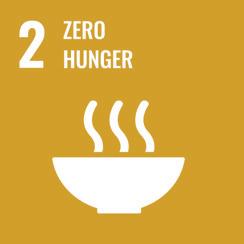
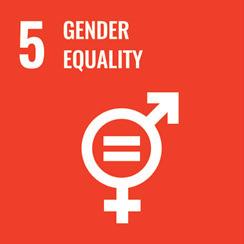
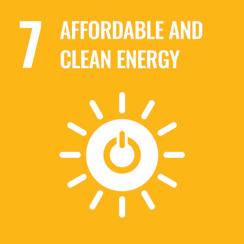
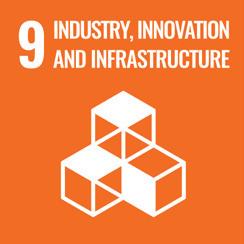
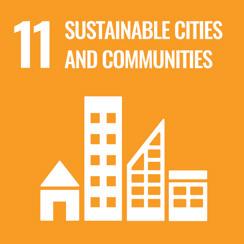
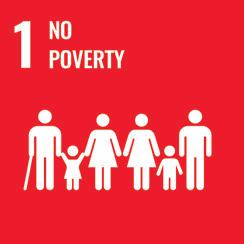

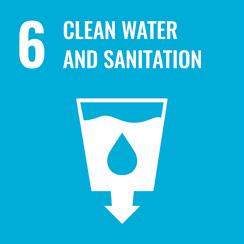
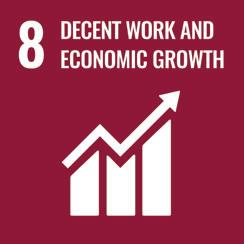

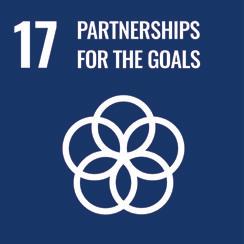
Arizona State University is dedicated to supporting thriving communities by fostering an environment of inclusivity, collaboration and innovation. Through impactful community engagement initiatives, educational programs and partnerships, ASU empowers individuals to create positive change. The university’s commitment to social responsibility ensures that its resources and expertise benefit not just the campus, but also the surrounding communities and beyond. By addressing local and global challenges, ASU plays a vital role in nurturing communities that are resilient, vibrant and poised for a sustainable future.
“As a model 21st-century university, ASU is dedicated to developing innovative solutions to the world’s most complex challenges. This commitment is built into our charter and is reflected throughout our institution’s design. We are ‘all in’ to lead in the creation of a better and more sustainable future for all.”
Michael M. Crow, University President
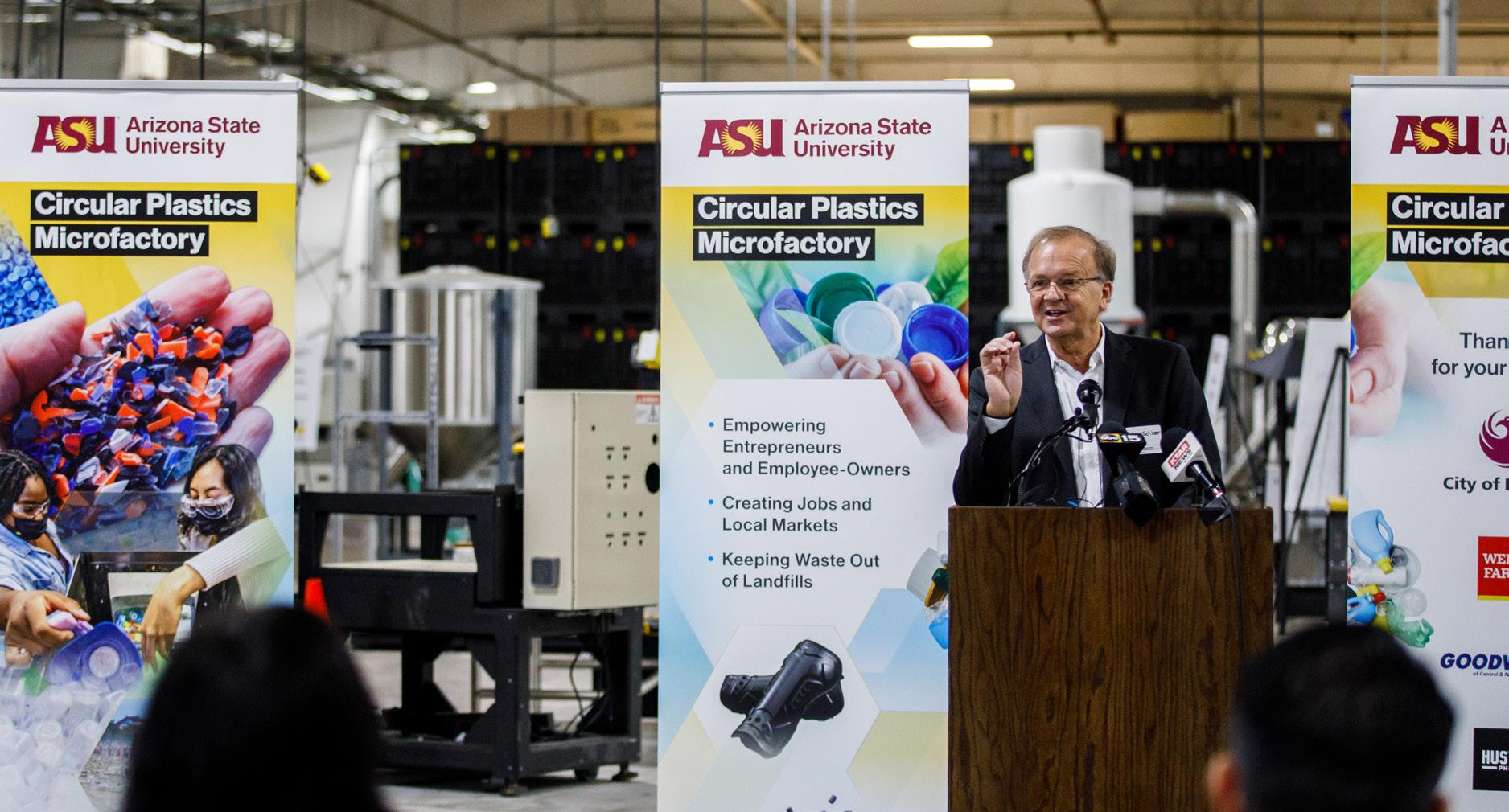
Arizona State University launched the Circular Plastics Microfactory, a first-of-its-kind facility for recycling and remanufacturing plastics.
Opened in February 2024, the facility transforms plastic waste into reusable materials, such as furniture, skateboards and other plastic components. The facility is expected to divert 550 tons from landfills annually.
The pioneering microfactory is a collaboration between ASU, Goodwill of Central and Northern Arizona, Hustle PHX and the city of Phoenix. It is located at the Phoenix Goodwill Retail Operations Center.
This project aligns with Phoenix’s zero waste goal of diverting 90% of waste from landfills by 2050. Phoenix Mayor Kate Gallego highlighted the importance of the Circular Plastics Microfactory, positioning Phoenix as a leader in sustainability and innovation.
The microfactory’s innovative approach supports waste reduction and fosters local economic growth
by creating skilled job opportunities. Additionally, local entrepreneurs from marginalized communities may turn it into a cooperative business model in the future.
The Circular Plastics Microfactory comes from ASU’s Circular Living Lab, which experimented with small-scale plastics recycling before expanding to this larger initiative.
The Rob and Melani Walton Sustainability Solutions Service within the Julie Ann Wrigley Global Futures Laboratory® leads ASU’s involvement, emphasizing the university’s commitment to creating circular economies that keep waste out of landfills and reduce greenhouse gas emissions.
The microfactory shows how sustainable practices can be integrated into the economy while benefiting the community and the environment. ASU and its partners hope to replicate the microfactory model in other regions, transforming waste management practices globally and providing new economic opportunities, especially for women in developing countries.
Editor’s note: Read the original announcement by Mikala Kass, published Feb. 7, 2024, on ASU News.
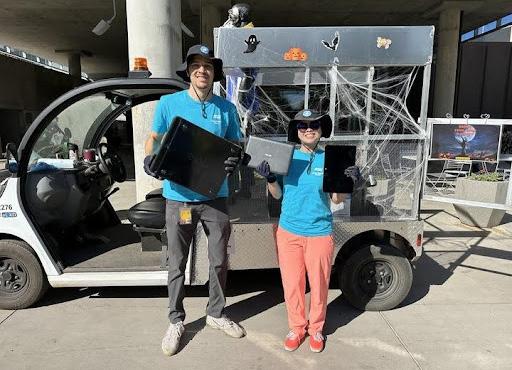
The October 2023 ASU Campus E-Waste Collection Event gathered over 700 pounds of e-waste from the Sun Devil community with strategically placed collection areas on the Tempe campus.
ASU Zero Waste collected broken, used or unwanted electronic devices, giving students, faculty and staff a convenient way to recycle e-waste responsibly and keep harmful materials out of landfills. ASU Enterprise Technology also collaborated on the event.
ASU volunteers joined Zero Waste representatives during Blue Bag Sorting Events to sort the collected e-waste. These events target hard-to-recycle materials and give participants hands-on experience while learning about the life cycle of their waste — recycling, sorting and final destination.
Roughly 125 volunteers attended over 15 Blue Bag Sorting Events and sorted nearly 61,000 pounds of materials, including approximately 14,500 pounds of e-waste. Blue Bag events highlight the importance of community involvement in sustainability and demonstrate the impact of collective action on waste reduction.
Zero Waste plans to expand the Campus E-Waste Collection Event to all ASU campuses and collect more materials. Through this initiative, the ASU community can contribute to a more sustainable campus while gaining valuable insights into waste management.
Arizona State University has joined the Transportation Electrification Activator, a collaborative initiative to shift Arizona away from fossil fuel-dependent vehicles to ones powered by sustainable energy sources.
TE Activator’s model emphasizes transparent action plans, public accountability and a results-oriented approach using these strategic priorities:
1. Empowerment: Engage all citizens in the transition to electrified transportation.
2. Prioritization: Focus on high-use vehicles to maximize impact.
3. Infrastructure deployment: Build the charging infrastructure to support electric vehicles.
4. Equitable benefits: Ensure all Arizonans share the advantages of electrified transportation.
ASU joins a stakeholder group from across multiple industries, including:
▪ American Lung Association of Arizona.
▪ Cities of Mesa, Tempe and Phoenix.
▪ Salt River Project.
▪ The Southwest Energy Efficiency Project
Visit the TE Activator webpage to learn more.
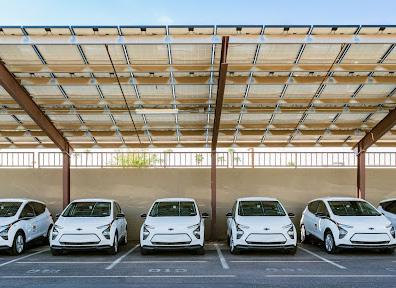
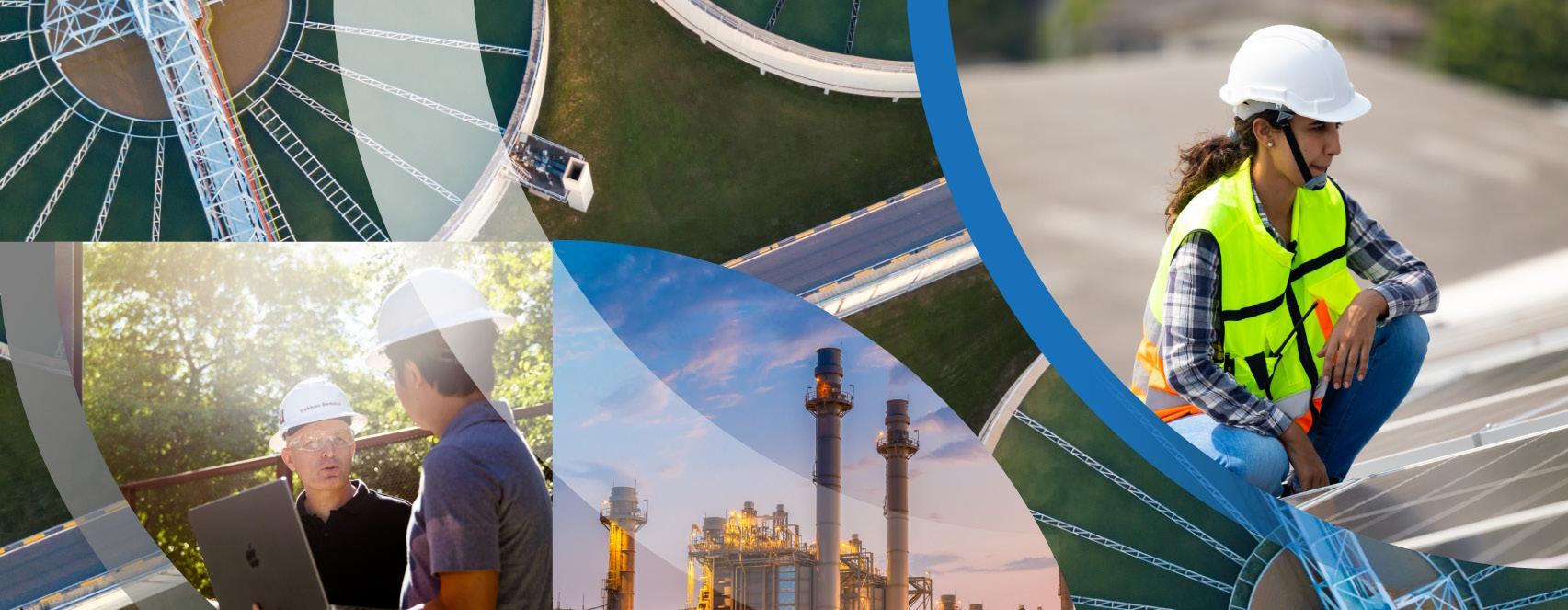
In January, the U.S. National Science Foundation announced that Arizona State University will lead a multi-institutional enterprise to confront the climate challenges facing the desert Southwest and spur economic development in the region.
The effects of climate change are acutely evident in the American Southwest, from the desertification of Utah’s Great Salt Lake to record-breaking extreme heat in Arizona and a dwindling supply of Colorado River water reaching Nevada.
NSF Engines: Southwest Sustainability Innovation Engine will use these challenges to catalyze economic opportunity and seeks to establish the Southwest as a leader in carbon capture, water security and renewable energy, and bring high-wage industries to the region. Southwest Sustainability Innovation Engine unites academic, community, nonprofit and industry partners across Arizona, Nevada and Utah that are committed to this goal.
“Our rapidly developing global challenges, if unabated, will result in a planetary emergency. They require immediate action, and the NSF Regional Innovation Engines award offers a new, transformative avenue to apply our holistic sustainability innovation approach to
the Southwestern United States to keep this region on a path of economic growth,” said Peter Schlosser, vice president and vice provost of Global Futures at ASU, as well as director of the Julie Ann Wrigley Global Futures Laboratory and co-principal investigator of this project.
“The Southwest Sustainability Innovation Engine combines the extensive expertise of ASU and all our partners to simultaneously ensure a sustainable future and prosperity for our region.”
ASU’s Global Futures Laboratory is leading efforts for SWSIE, supported by ASU’s Ira A. Fulton Schools of Engineering.
Southwest Sustainability Innovation Engine, or SWSIE, is among the first proposals selected by the NSF to establish a Regional Innovation Engine, a first-of-its-kind NSF program to create focused research and technology transfer hubs.
SWSIE combines perspectives and expertise from more than 50 partners from academia, industry, nonprofit and entrepreneurial organizations, and local and regional governments. Industry partners range from established companies with ambitious sustainability goals to businesses providing sustainability-based products and services, while nonprofit partners represent a variety of environmental interests across the Southwest.
Editor’s note: Read the full story by Pete Zrioka, published Jan. 29, 2024, on ASU News.
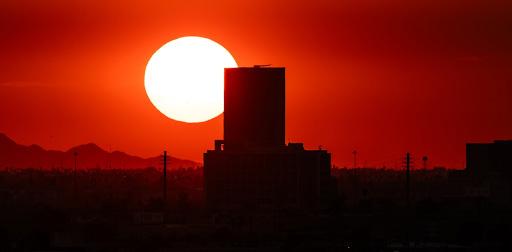

ASU team’s research leads to new law protecting mobile-home residents
Arizona Gov. Katie Hobbs signed a law earlier this year that guarantees mobile-home owners’ right to install cooling measures, thanks in large part to the work of an Arizona State University team.
The Knowledge Exchange for Resilience at ASU (KER), an interdisciplinary center that works with communities to research and solve problems, worked for more than five years on the problem of extreme heat and mobile homes in the Valley.
Patricia Solís, executive director of KER, said that the team worked closely with mobile-home owners to pinpoint why so many people who live in mobile homes are vulnerable to extreme heat.
The data they collected led to the new law, which prevents landlords from denying tenants the right to install an air conditioner or other cooling measures. Hobbs signed it as an emergency action and it went into effect immediately, on April 2.
“This is an inspiring example of what can happen when you work on the issues that come from the community,” said Solís, who testified about ASU’s research on the topic at the Arizona Legislature in January. “This is the reason I came to ASU — to do this kind of work. This is what KER was established for. This is what the ASU Charter was established for.”
The problem is critical because while mobile homes account for 5% of the housing in Maricopa County, about 30% to 40% of indoor heat deaths in any given year are people who live in mobile homes, according to the research by the center.
KER found that in Maricopa County, mobile-home dwellers who died from the heat were twice as likely to not have had air conditioning as victims who died in other kinds of homes. For mobile-home residents who did have air conditioning but died anyway, they were three times more likely to have had their electricity turned off compared with victims from other home types.
The project started when KER was formed in 2018, funded by a grant from the Virginia G. Piper Trust. The team began working on the issue of extreme heat with a consortium of groups that provide assistance with utility bills.
The ASU team cross-referenced location data of where people received utility assistance with location data from Maricopa County of heat-associated deaths. There were many places that overlapped, but some spots showed a lot of deaths and little utility assistance.
Those turned out to be mobile-home communities.
“We did the math and, sure enough, there are many reasons that people who live in mobilehome parks are more vulnerable to extreme heat,” Solís said.
The research found that mobilehome dwellers were more likely to be older, live alone and have lower incomes. Many mobile homes are densely packed together on top of asphalt, increasing the heat.
The center put together a guide on how to mitigate heat in mobile-home communities by using methods such as shade sails and roof insulation. The Arizona Association of Manufactured Home, RV & Park Model Owners distributed the guide. Then that uncovered a deeper problem.
“We were hearing back, ‘I’d love to put a shade sail over my home but my landlord won’t let me,’” Solís said. “People were saying that their landlords were stopping them from putting in window air-conditioning units in the front of their houses because they could be seen from the street. It doesn’t make any sense to say, in Arizona, that you can’t put this in your home.”
“There are many reasons that people who live in mobile-home parks are more vulnerable to extreme heat.”
Also, because while residents might own the home, they lease the land (often from the park owner), so they are not direct customers of utilities — the landlord is — and they cannot apply for utility assistance. To drill down further on the risk factors, KER began working with the Arizona Association of Manufactured Home, RV & Park Model Owners, a residents’ advocacy group.
Solís reached out to several ASU students who were residents at a mobile-home park, and they were instrumental in getting their neighbors to participate in surveys about heat issues.
“We started out not knowing what the questions were, but in the process of discovery, we uncovered them step by step,” said Solís, who sat in sweltering homes while interviewing residents.
“We measured how hot it was and, in some homes, it was 105 degrees indoors during the summer,” she said. “I had people say things to me like, ‘I might not be here if you come back next year. I might not survive another summer.’”
The research needed to be transformed into policy that would allow residents the right to mitigate heat in their homes. KER shared its data with Wildfire AZ, a Phoenix-based anti-poverty organization that started the first warm-weather fuel fund in the country, in 2005.
“The lightbulb moment came out of ASU discovering the disproportionate number of heat-related deaths in mobile homes,” said Maxine Becker, attorney advocate for Wildfire AZ.
Wildfire shaped the language that became bill HB2146 and found a sponsor in Rep. David Cook.
“We found that no matter the party affiliation, every member we talked to was compassionate and wanted to make a difference,” Becker said. “They saw that this was something where the Legislature could intervene on behalf of people who are struggling in these mobile-home parks.”
The committee voted unanimously to move the bill forward and it was approved unanimously by both the full House and the Senate. While the new law is a victory, the issue of vulnerability to extreme heat is ongoing.
“A third of indoor heat-associated deaths in the county are people who do have air conditioning and electricity and choose not to use it because they presume they can’t pay for it,” Solís said. “There are still a lot of problems to solve.”
Editor’s note: Read the full story by Mary Beth Faller, published April 11, 2024, on ASU News.
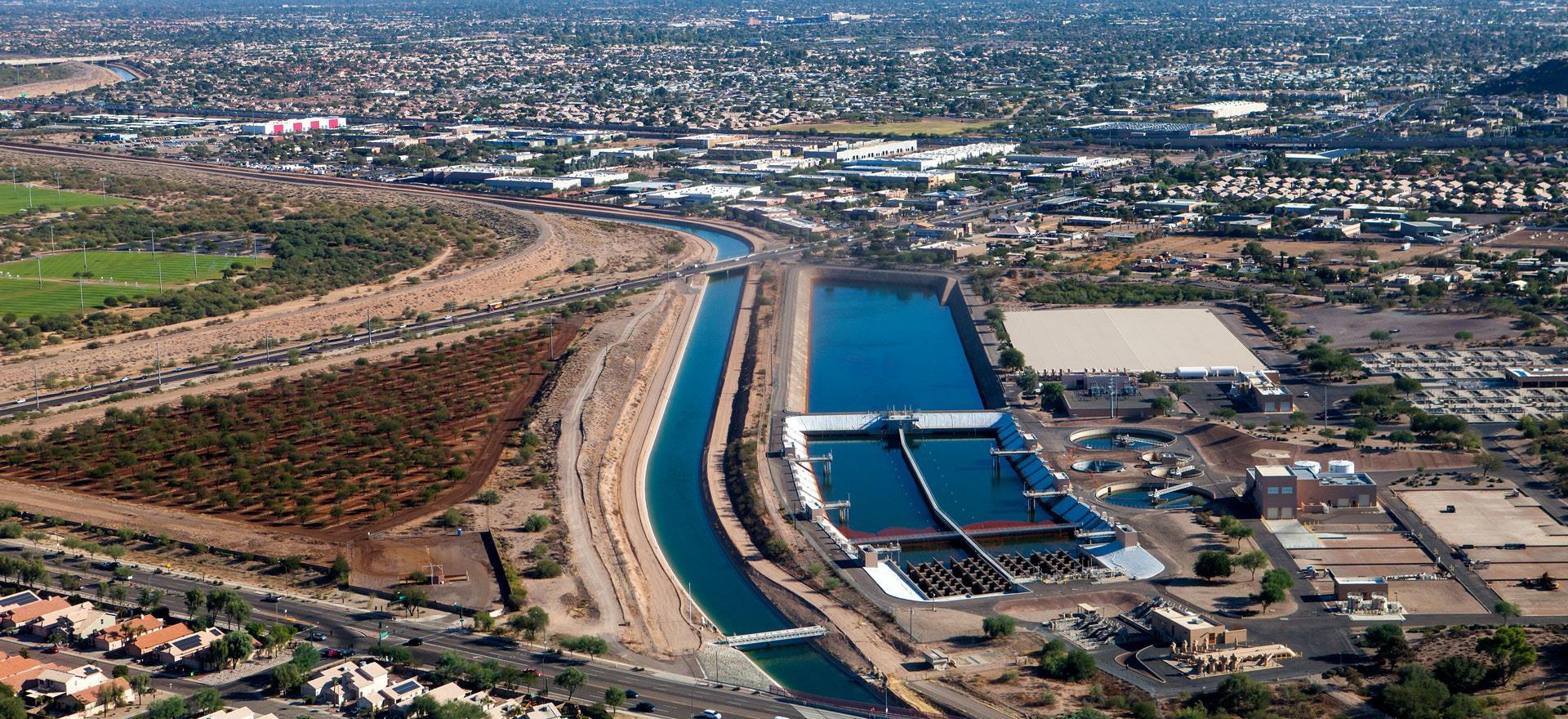
On a warming planet, a sustainable water supply is essential. As a unique test bed for transdisciplinary solutions, Arizona State University is at the forefront of a new mission: To secure a thriving water future in Arizona and beyond.
The newly launched Water Institute within the Julie Ann Wrigley Global Futures Laboratory is an international center for scholarship and action designed to predict and address water challenges from community to international scale. Drawing from existing academic capacity across ASU, the institute will develop educational, research and communication projects that benefit Arizona, the region, the nation and the global community.
The institute is led by Upmanu Lall , professor, School of Complex Adaptive Systems, College of Global Futures. In 2021, Reuters included Lall in the “Hot List of the world’s 1,000 top climate scientists.”
At the formal launch event of the institute, Lall said the institute specifically explores how technological innovations, financing mechanisms, policy
instruments and field implementation strategies can support a stronger future for life on Earth.
“Water touches every aspect of human and ecological activities,” Lall said in the event’s keynote speech. “We have a society that has already managed to figure out how to overcome many obstacles, and we now have to understand how to move water solutions forward instead of preaching about what the problems are. That’s the culture that we want to create, and it builds on the culture that already exists at ASU.”
In addition to connecting current water experts at ASU, the Water Institute aims to create a national consortium of universities, industry and public agencies to assess and meet needs for water and climate adaptation. The institute will also work with the World Bank Group and related organizations to address groundwater depletion and climate hazard impacts across the world.
Lall’s additional priorities include developing a program in weather engineering, in addition to exploring how to reduce evaporation and increase energy production through the installation of floating solar electricity technology on Western reservoirs.
At the regional level, another effort at ASU — the Arizona Water Innovation Initiative — is a multiyear initiative aimed at strengthening Arizona’s water supply. This initiative is also led by the Julie Ann Wrigley Global Futures Laboratory, in collaboration with the Ira A. Fulton Schools of Engineering.
“This is a critical innovation moment for water in the state of Arizona, and frankly for all seven basin states who have been sharing responsibility for creating water policy in this region for more than 100 years,” said ASU President Michael M. Crow in the initial announcement of the initiative. “The Arizona Water Innovation Initiative will strengthen water resilience while enhancing economic competitiveness, supporting high-value job creation, and recruiting and retaining leading industries.”
The Arizona Water Innovation Initiative is supported by five “pillars” with specific focus areas:
▪ The Global Center for Water Technology seeks to discover and demonstrate scalable solutions for industrial, municipal and agricultural sectors throughout the state of Arizona.
▪ The Advanced Water Observatory and Decision Support System revolutionizes water measurement, modeling and prediction. It also provides data necessary to identify critical risks, vulnerabilities and capabilities in hydrologic systems.
▪ The Kyl Center for Water Policy promotes research, analysis, collaboration and dialogue to build consensus on sound water stewardship for Arizona and the West.
▪ Impact Water — Arizona catalyzes community understanding and engagement in Arizona’s water challenges and potential solutions. It includes five integrated workstreams focused on policy impact, inclusive engagement, science and technology translation, immersive experiences and water futures.
▪ The Arizona Water for All program works with Arizona’s most water-insecure households to improve water security and engagement in water decision-making using communitybased participatory approaches.
In the first year of this multi-year, $40 million investment by the state of Arizona — alongside a $5 million gift from the Virginia G. Piper Charitable Trust — the initiative has strengthened Arizona’s water resilience through technological developments, applied research, partnerships and community engagement. More information on the initiative’s first year can be found in the Arizona Water Innovation Initiatives “year in review” report

The ASU Garden Commons at the Polytechnic campus recently completed its phase two expansion, introducing a new outdoor event area, additional growing plots and a meditation space. The expansion provides a serene, nature-filled retreat that promotes relaxation and stress relief through a multi-sensory experience.
The Garden Commons will continue to host and develop its educational programs and outreach, including:
▪ Seasonal farm stand.
▪ Student Ambassador Program.
▪ Various environmentally-focused events and workshops.
The Garden Commons was created to reconnect people to where food comes from and support and produce a sustainable food system.

In 2023, the ASU Swette Center for Sustainable Food Systems, in partnership with three other universities and FoodCorps, received an $18.5 million grant centered on educating the next generation of food systems leaders.
The first year of the United States Department of Agriculture Nextgen at ASU has been transformative, marked by significant scholarships and internships to prepare students to enter the food and agricultural workforce. A “first year” report demonstrates a growing base of future leaders in food systems.
Funded through this grant, the USDA NextGen program at ASU is creating a pipeline of diverse
professionals, trained and ready for future careers in the food and agriculture sector, particularly at USDA. The program includes scholarships for undergraduate and graduate students studying sustainable food systems, paid internship opportunities, workshops to navigate USAjobs.gov, a Model USDA event and more. It engages the community as well, hosting conversations about future USDA workforce needs based on community-identified gaps in service.
Editor’s note: Read the original news story announcing the grant by Katelyn Reinhart, published June 21, 2023, on ASU News.
Supporting thriving communities
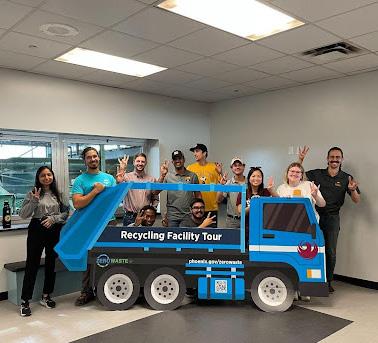
ASU Zero Waste recently launched its Materials Recovery Facility Tours, allowing ASU community members to visit local recycling facilities, promote recycling habits and encourage sustainable purchasing.
In October 2023, 17 students, employees and Mirabella at ASU residents visited the Materials Recovery Facility to get a behind-the-scenes look at its intricate sorting process and the recycling facility’s challenges.
In March 2024, Zero Waste organized a second tour at ER2 — ASU’s e-waste recycling partner — so visitors could explore why proper disposal of electronic waste is environmentally critical.
ASU Zero Waste team plans to offer these educational tours twice a year.
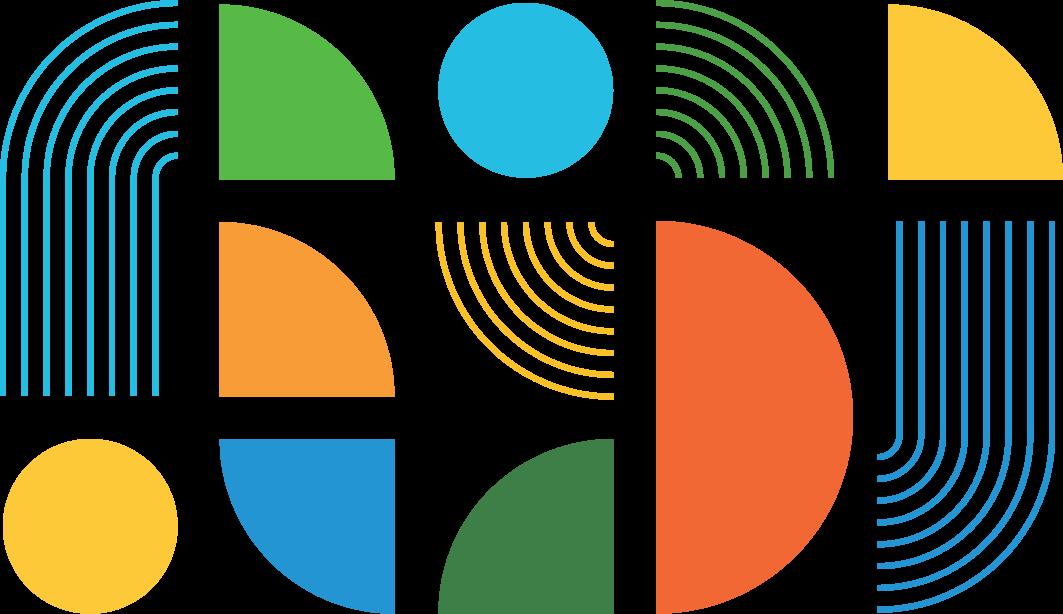
Reshaping our relationship with the planet
In this section:
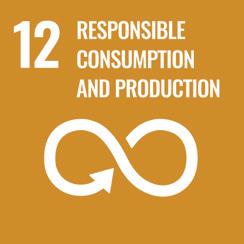
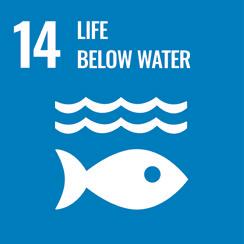
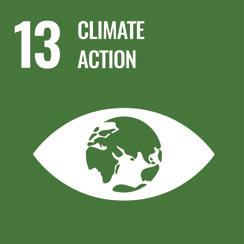
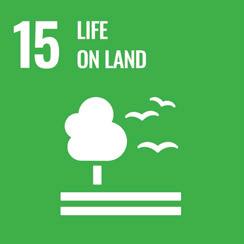
Arizona State University is at the forefront of preserving our planet, driving innovative sustainability practices that influence global change. Through cutting edge research, renewable energy initiatives and comprehensive waste reduction programs, ASU is committed to creating a sustainable future. The university’s leadership in developing a circular economy, reducing carbon emissions and fostering environmental stewardship across its campuses sets a powerful example for institutions worldwide. ASU’s dedication to sustainability isn’t just a mission — it’s a movement that inspires action and transforms the way we care for our planet.
“Humanity has already demonstrated that we have the power to shape our world. It is up to us to ensure that we are building a thriving and sustainable future for generations to come.”
Peter Schlosser, Vice President and Vice Provost of Global Futures at ASU
Reshaping our relationship with the planet
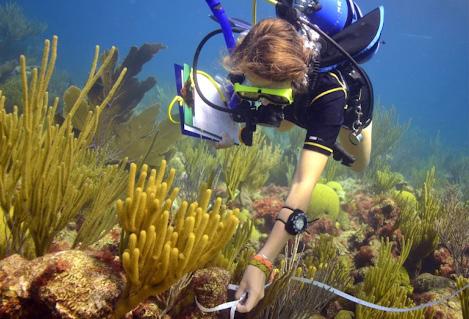
ASU Bermuda Institute of Ocean Sciences looks back on past 120 years of marine research
The ASU Bermuda Institute of Ocean Sciences (ASU BIOS), one of the world’s longest-running research and educational institutions, held a symposium and community reception in Bermuda using World Ocean Day to celebrate its more than 120 years of marine research.
The event showcased innovations and discoveries in marine science that aim to improve planetary health, economic growth and the lives of people around the world. The symposium focused on future opportunities made possible through ASU BIOS, ocean observations and trends, autonomous systems and robotics and ocean services. ASU BIOS is home to some of the longest-running sets of ocean
observations available in the world, including the Bermuda Atlantic Time-series Study (BATS), and has contributed greatly to climate and ocean research.
William B. Curry, president and CEO of ASU BIOS, said the presence of the institute — including the offshore Hydrostation-S that has been in operation since 1954 — and the work that is conducted in Bermuda has shaped a large deal of understanding of the ocean’s systems and impacts.
“As our world continues to encounter increasingly stressed natural and environmental systems due to human activity, we as ocean and climate researchers
Reshaping our relationship with the planet
stand at the forefront of understanding what our world’s largest biome is experiencing, how it is reacting and what we as humans can do to help it return to a place of optimal well-being,” Curry said.
Speakers at the symposium represented a blend of climate and ocean scientists with diverse research interests, with insights and conversations from experts such as Katja Matthes, Detlef Stammer, Douglas Wallace and Martin Visbeck. Other speakers included ASU scientists Victoria Keener, Amy Maas, Upmanu Lall and Susanne Neuer.
ASU BIOS also announced a new scholarship program that will award five full-tuition undergraduate scholarships annually for Bermudian students interested in studying in person in Arizona under any available ASU program. Eligible students will be selected based on both high performance in previous academic work and financial need.
Additionally, ASU has created a scholarship fund for all other Bermudian students that will provide tuition awards to reduce the cost of attendance in person to half of the standard international student tuition rate (the full rate is $34,398 for the 2023–24 academic year), or reduce the academic year tuition rate for full-time students in undergraduate online programs (24 credits) to $11,500.
“Today’s announcement is a further testament to the collaborative effort to support Bermuda’s students and the power of international relationships,” said David Burt, premier of Bermuda. “As a small island, Bermuda must continue to develop and expand international partnerships like the one with Arizona State University, which will provide new opportunities for Bermudians. I am grateful to the Arizona State University Board of Trustees for the extension of this significant commitment of scholarships and look forward to this government further developing the relationship between ASU and the Bermuda College for the benefit of all Bermudians today and for many years to come.”
Students may enroll as either first-year students with no earlier higher education experience or can enter as transfer students from community college or other higher education institutions. ASU will continue to work with Bermuda College on appropriate pathway programs.
The scholarship awards signify the start of a new era for ASU BIOS, which was originally established in 1903 to better understand our ocean and its impact on planetary outcomes. Bermuda offers unique proximity to the Atlantic Ocean and a diverse marine environment, including the ocean’s northernmost coral reefs.
In addition to the research conducted at ASU BIOS, the institute offers a range of educational opportunities. Students in elementary school and beyond can take part in hands-on programs aimed at inspiring future generations of scientists. College students, including those at ASU’s School of Ocean Futures, can participate in both online and in-person summer and fall semester courses at ASU BIOS.
The research institute merged with Arizona State University’s Julie Ann Wrigley Global Futures Laboratory in 2021 and remains an internationally recognized center for educational opportunities, ocean science, atmospheric research and environmental monitoring and mapping.
“If we are exploring possible futures for our world, we have to take a holistic approach to understand the interlinkages between all components of the Earth system,” said Peter Schlosser, vice president and vice provost of Global Futures at ASU. “As the oceans play a major role in this system, the partnership between the Global Futures Laboratory and BIOS is critical to our endeavor of shaping a future in which all life can thrive.”
Schlosser said the next 120 years and beyond are full of opportunities, but humanity must move quickly to actualize a more sustainable future.
“Our world has changed immensely since 1903,” said Schlosser. “We have learned a great deal about the role of the ocean in our rapidly changing Earth system, but much work remains to be done to create the knowledge that ensures that our oceans remain healthy and can continue to provide the services that sustain life on our planet.”
Editor’s note: Read the full story by Katelyn Reinhart, published June 7, 2024, on ASU News.
Reshaping our relationship with the planet
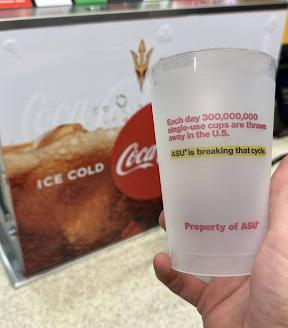
Arizona State University launched a reusable cup pilot at Desert Financial Arena in collaboration with Bold Reuse, Swire Coca-Cola and Sodexo.
ASU made a significant step in reducing campus waste with the pilot, culminating at the ASU Pow Wow in April 2024. Bold Reuse, funded by a grant from the Arizona Department of Environmental Quality, launched the initiative by replacing singleuse cups at the Pow Wow with reusable ones to assess operational impacts and consumer behavior. The event achieved a 92% cup return rate, diverting nearly 1,300 single-use cups from landfills.
Increasing reuse across campus is crucial to ASU’s circular resource system goal, targeting 90% diversion and 30% aversion by fiscal year 2025. The reusable cup pilot will shape the university’s future approach to integrating reusables into other events and services.
Arizona State University’s online Waste Directory tool is a comprehensive resource designed to help the Sun Devil community dispose of various materials properly.
The Waste Directory provides detailed guidance on how to recycle, compost or dispose of items ranging from everyday waste to specialized materials like electronics and hazardous waste.
The directory supports the university’s sustainability goals by offering specific instructions tailored to ASU’s waste management infrastructure, including its zero-waste initiatives.
This user-friendly directory empowers students, faculty and staff to make informed decisions that will contribute to reducing the university’s environmental footprint.
Reshaping our relationship with the planet
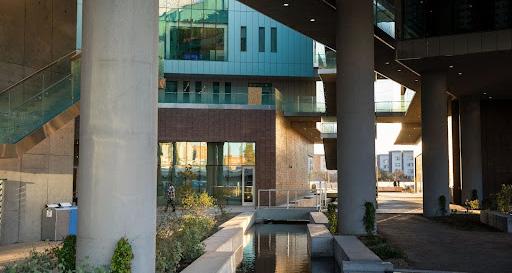
ASU’s Walton Center for Planetary Health earns platinum sustainability ranking
Located as the eastern gateway for Arizona State University’s Tempe campus and standing against the city horizon sits the Walton Center for Planetary Health . It is a building some may recognize as much by shape as for its namesake: Its unique exterior walls, which face outward toward one of the busiest intersections on campus, mimic the self-shading properties of cacti while the pedestrian bridge that crosses over University Drive is ensconced by a shade structure that looks like a cocoon.
The building is the primary home facility for ASU’s Institute of Human Origins and Julie Ann Wrigley Global Futures Laboratory. The Walton Center is a physical demonstration of ASU’s commitment to inclusion and discovery through a sustainable space that enables the development of options for a thriving future. It was also recently awarded a LEED platinum certification, the highest ranking in the world’s most widely used green building rating system.
LEED, which stands for Leadership in Energy and Environmental Design, is a credits-based rating system established and governed by the U.S. Green Building Council that offers a framework for recognizing efficient “green” buildings. According to USGBC, “All LEED credits relate to climate change, impacts on human health, water resources, biodiversity, the green economy, and community and natural resources.”
Peter Schlosser, vice president and vice provost of Global Futures at ASU, said the platinum ranking demonstrates the interdisciplinary approach and commitment to the work taking place within the Walton Center.
“The Walton Center unites our faculty, staff and students in our shared goal of developing solutions towards a thriving future on a healthy planet,” Schlosser said. “This goal is what drives us, and it is now reflected in the building itself. We hold ourselves to the highest standards in sustainability, innovation and progress. This LEED Platinum certification is a testament to that.”
Tom Reilly, an Architekton architect and the project manager for the Walton Center while it was being built, said that creating the Walton Center required a large team of experts in both the architectural, construction and sustainability spaces.
“Our primary goal was to design an extremely sustainable project,” Reilly said, “and what we found is that the LEED certifications come along naturally when you do that correctly.”
The Walton Center was a nearly three-year project, spanning from January of 2019 through December of 2021. As a 281,000 gross-square-foot, high-performance research facility, the building had to include lab space, classrooms, exhibit spaces and conference spaces. The project required a large team, Reilly said, and included in that team was Architekton design architect Rachel Green Rasmussen. Rasmussen and Reilly agreed that the LEED framework was used as a tool to bring the team together under a shared vision.
“I think LEED is really valuable for creating a roadmap,” Rasmussen said. “It created a common language for the team to work through throughout the design and construction process, and we were able to incorporate those ideals into the project early on.”
Architecture services were provided by companies Architekton and Grimshaw, with construction done by McCarthy Building Companies, Inc. Project Lead for McCarthy, Carlos Diaz, said sustainability was at the forefront of the project from the construction of the building itself down to the waste management of building materials.
Since 2005, Arizona State University now requires, to the fullest extent practicable, Leadership in Energy and Environmental Design Silver certification for all new construction of university owned and operated buildings.
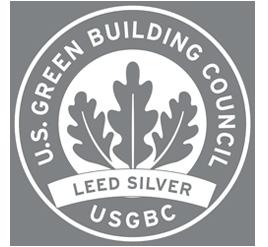
“When you bring in materials for a construction site, a lot of what you touch also ends up being taken down,” Diaz said. “So we thought a lot about what we could do with that material. Is there a possibility of reuse? How can we give it a new life? Using those strategies and now seeing the building represent that mindset is a really good feeling.” 52
8,335,742 27.6%
Reshaping our relationship with the planet
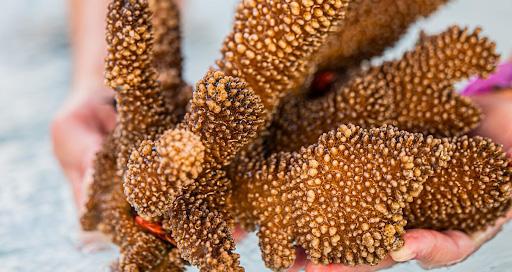

‘Āko‘ako‘a’s efforts include building a coral nursery — the largest of its kind — that opened on April 25
When the ‘Āko‘ako‘a reef restoration program was established in 2023, it brought together decades of research, community partnerships and a commitment to healthy coral reefs in West Hawaii.
The community-based effort fuses state-of-the-art science programs with the leadership and cultural knowledge of Hawaii’s community partners to enable coastal and reef sustainability for generations to come. Named ‘Āko‘ako‘a (pronounced ah kō-a kō-a), the effort shares a dual meaning: “to assemble” and “coral.”
On April 25, scientists and community members affiliated with ‘Āko‘ako‘a celebrated an important expansion of the work done through this initiative: the official launch of a new, state-of-the-art coral research and propagation facility in Kailua-Kona.
Reshaping our relationship with the planet
Greg Asner, director, ASU Center for Global Discovery and Conservation Science, and founder of ‘Āko‘ako‘a, said the new facility will serve as a kind of medical facility for corals, housing broken corals that require care to recover, grow and reproduce.
Varying technical methods of coral reef restoration will take place in the coral nursery, led by team members from ASU, partners from the state of Hawaii’s Division of Aquatic Resources and other partners on the island. The facility consists of 72 coral raceways, or tanks, and is the first land-based coral nursery facility on the island. This facility will support the restoration of 120 miles of coral reefs off the west coast of the Big Island, which have been in decline for the past 50 years.
“We are here because Hawaii’s coral reefs are in trouble,” Asner, also a senior Global Futures scientist with the Julie Ann Wrigley Global Futures Laboratory at ASU, said during the ceremony. “Our vision of a thriving coastline would be impossible to achieve without our generous donors, our site partners, our cultural advisory group, our community partners and everyone who has played a role. We have challenges ahead of us, but this is the ultimate winning team.”
The many ASU team members engaged with ‘Āko‘ako‘a include molecular ecologists, remote sensing experts, dive teams, environmental educators, hydrologists
and systems engineers. Asner said other ASU researchers and on-site collaborators will greatly contribute to the care of the corals that come into the facility. A diagnostics team will measure and monitor the reefs and water quality to diagnose the problems, and a restoration team will act on that diagnosis.
Jeana Kelekolio, a Native Hawaiian lineal descendant of Hōnaunau Bay and cultural advisor to ‘Āko‘ako‘a, said that her family relies on the sea and its corals. With a decline in coral reef health and the rise of coral bleaching events, she has directly felt the impact.
“Our families from all over Hawaii can see the difference: Our fish are not there, our limu [seaweed] is gone,” she said. “But I am so excited to be here at this launch today. Our culture shouldn’t die with my 14-year-old grandsons — they should know how to survive and be cultural practitioners like me and my father before me. ... [They should know] how to take care of the ocean, the reef, the limu. We all have to work together as one family, for the greater good, for the future of our culture and for the future of tourism. I believe we can work hand in hand to make that happen.”
Editor’s note: Read the full story by Katelyn Reinhart, published May 9, 2024, on ASU News.
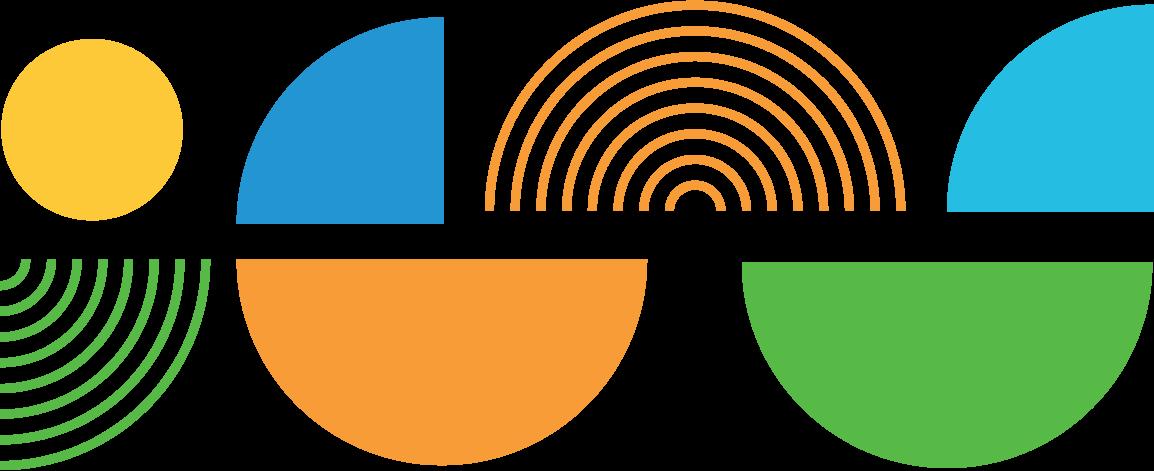
Building a sustainable and thriving future for all requires a transdisciplinary approach. At Arizona State University, many of these efforts align with the Sustainable Development Goals.
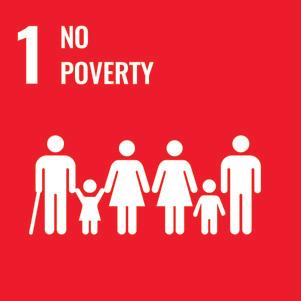
End poverty in all its forms everywhere.
ASU offers ASU TRIO; College Attainment Grant; the ASU Education for Humanity
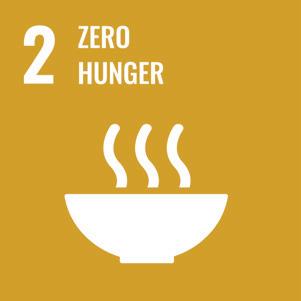
End hunger, achieve food security and improved nutrition and promote sustainable agriculture.
ASU offers the Garden Commons; Swette Center for Sustainable Food Systems; Pitchfork Pantry; Sun Devil Hospitality; the ASU Zero Waste program; Waste Watchers; the Global Locust Initiative
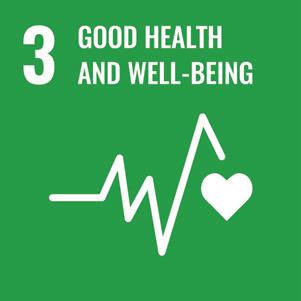
Ensure healthy lives and promote well-being for all at all ages.
ASU offers Knowledge Exchange for Resilience; HeatReady™; mental health support; a smoke-free policy; sexual and reproductive health care services for students; health outreach program ; collaborations with health institutions; shared sports facilities; Global Center for Applied Health Research; the Office of Community Health
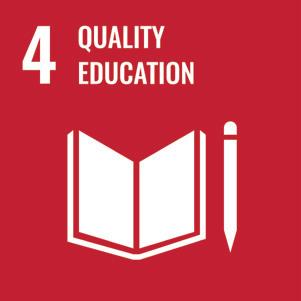
Ensure inclusive and equitable quality education and promote lifelong learning opportunities for all.
ASU offers the General Studies Gold curriculum ; the GlobalResolve learning program; robust scholarship programs; free and public access to educational resources; educational events; education outreach activities beyond campus; a lifelong learning access policy; the SolarSPELL Initiative; the Center for Innovation in Informal STEM Learning .
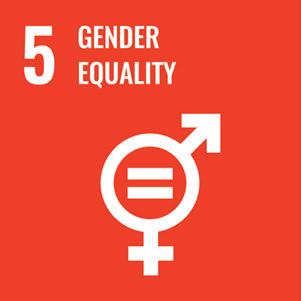
Achieve gender equality and empower all women and girls.
ASU offers participation in the WE Empower UN SDG Challenge and a collaboration with the U.S. Department of Energy to boost and support participation of women in the clean energy industry
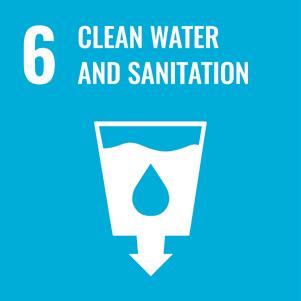
Ensure availability and sustainable management of water and sanitation for all.
ASU offers the Arizona Water Innovation Initiative; the Water Institute; the Kyl Center for Water Policy; the Global Center for Water Technology.
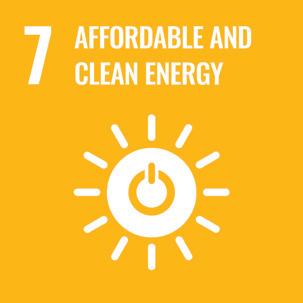
Ensure access to affordable, reliable, sustainable and modern energy for all.
ASU offers electric vehicle charging stations; a shared electric vehicle fleet; an electric intercampus shuttle; electric last-mile mail service vans; LightWorks; Center for Negative Carbon Emissions; Just Energy Transitions Center; Center for Energy and Society; EPICX: Electrified Processes for Industry Without Carbon . ASU demonstrated its commitment to 100% renewable energy beyond the university by aiding Fiji in its goal to generate all power from renewable sources by 2030.
ASU Facilities Development and Management requires that all new buildings must be climateneutral and earn at least LEED Silver
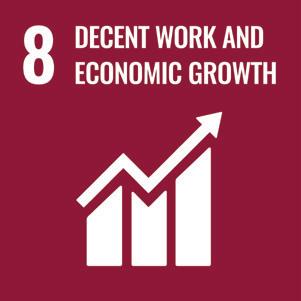
Promote sustained, inclusive and sustainable economic growth, full and productive employment and decent work for all.
ASU offers the Eco Reps program; employment practices - living wages; unions; discrimination policy; equivalent rights outsourcing; research compliance and appeal processes
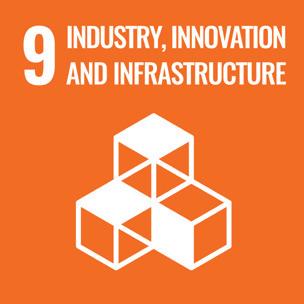
Build resilient infrastructure, promote inclusive and sustainable industrialization and foster innovation.
ASU offers the Fulton Schools of Engineering; Global KAITEKI Center; Southwest Sustainability Innovation Engine; SWAP Hub.
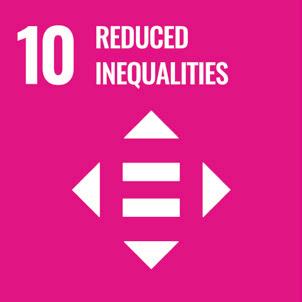
museums, libraries, facilities; Urban Climate Research Center; participation in the Healthy Urban Environments collaborative initiative; the Sustainable Cities Network AZ Heat Resilience Workgroup
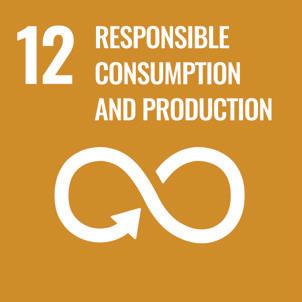
Reduce inequality within and among countries.
ASU offers a non-discriminatory admissions policy; anti-discrimination policies; I AM Mentor program; the ASU LIFT Initiative; the Tribal Nations Tour.
Ensure sustainable consumption and production patterns.
ASU offers a Circular Living Lab; the Waste Directory tool; sustainable purchasing guidelines; virtual sustainability tours; sustainable purchasing training for staff and faculty.
ASU is the largest Fair Trade university in the nation.
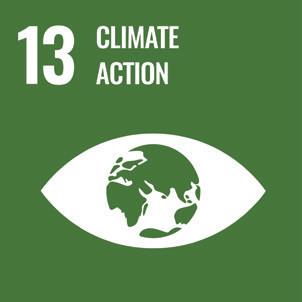

Make cities and human settlements inclusive, safe, resilient and sustainable.
ASU offers sustainable transit options; LEED-certified buildings; public access to ASU community amenities such as
Take urgent action to combat climate change and its impacts.
ASU offers environmental education and disaster planning and the Urban Climate Research Center.
Since fiscal year 2019, ASU has been carbon neutral for Scope 1 and 2 emissions.
ASU ranked #1 in the world for SDG 14 by
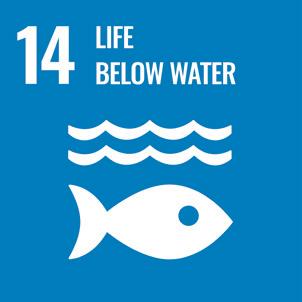
Conserve and sustainably use the oceans, seas and marine resources for sustainable development.
ASU offers the ‘Āko’ako’a reef restoration program; the ASU Bermuda Institute of Ocean Sciences; the Center for Global Discovery and Conservation Science; the School of Ocean Futures
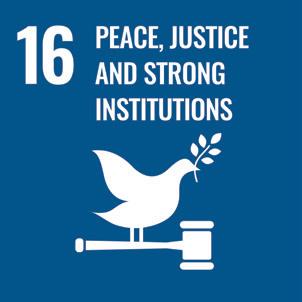
Promote peaceful and inclusive societies for sustainable development, provide access to justice for all and build effective, accountable and inclusive institutions at all levels.
ASU offers Office of the President Community Council; the Office of Government and Community Engagement; ASU University Senate; the Center for Urban Innovation partnerships
ASU ranked #3 in the world for SDG 15 by Times
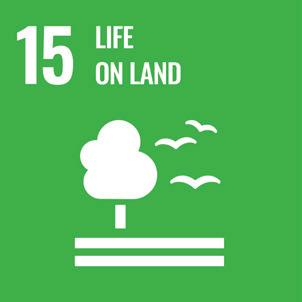
Protect, restore and promote sustainable use of terrestrial ecosystems, sustainably manage forests, combat desertification, and halt and reverse land degradation and halt biodiversity loss.
ASU offers the global secretariat of the Earth BioGenome Project; Center for Biodiversity Outcomes; Navajo Nation Stewardship plan; arboretum on ASU’s Tempe campus; campus harvests; the Central Arizona-Phoenix Long Term Ecological Research Program .
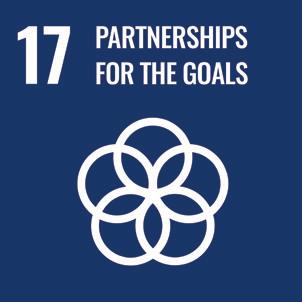
Strengthen the means of implementation and revitalize the Global Partnership for Sustainable Development.
ASU offers Transportation Electrification Activator efforts; the Southwest Sustainability Innovation Engine; the PLuS Alliance partnership.

In this section:
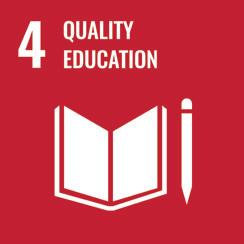

At Arizona State University, Sun Devils are champions of sustainability, embracing innovative practices and eco-conscious habits that drive positive change. Whether it’s reducing single-use plastics, engaging in zero waste initiatives or leading community projects, they are united in their commitment to creating a greener, more sustainable future. With every action, big or small, Sun Devils are shaping a world where environmental stewardship is at the heart of campus life, proving that sustainability is not just a goal. It is a way of life.
“True to our charter, ASU is committed to empower our students with the skills they need to not only understand the challenges of our time, but to make an impact in their respective communities through their future careers. Our newly launched General Studies requirements is one such example, ensuring that every ASU student is exposed to coursework in sustainability.”
Nancy Gonzales, Executive Vice President and University Provost
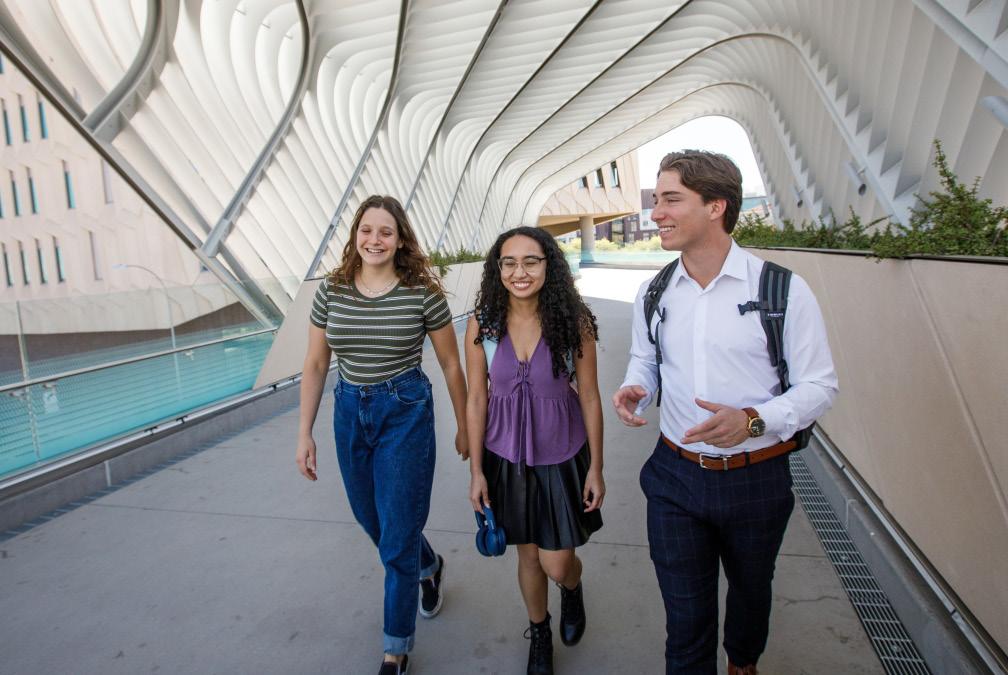
With new general
studies curriculum,
‘sustainability thinking’ to become part of every undergraduate student’s education
Arizona State University leadership has made tremendous effort too create programs and initiatives aimed at supporting a healthy planet and thriving future for all life — and now, more than ever, youth voices will be essential to the conversation.
One such effort, drawn from its charter and design aspirations, is ASU’s recent update to their general studies curriculum requirements. General Studies Gold, which specifies requirements for undergraduate students in the catalog year 2024–25 and beyond, has a number of changes from previous iterations
— most notably the new Quantitative Reasoning, Governance and Civic Engagement, American Institutions, and Sustainability categories.
“The goal of General Studies Gold is to empower students with skills and knowledge from outside their major,” said Vice Provost for Undergraduate Education, Anne Jones “From this interdisciplinary foundation, students will study both enduring questions and modern methods of problem-solving, so that they are prepared to contribute solutions to the challenges facing our present and future.”
The updated curriculum went into effect in fall 2024 for newly admitted students. To address these complex, global challenges, our world will need the help of tomorrow’s leaders.
As a member of the General Studies Council, José Lobo, a clinical associate professor in the School of
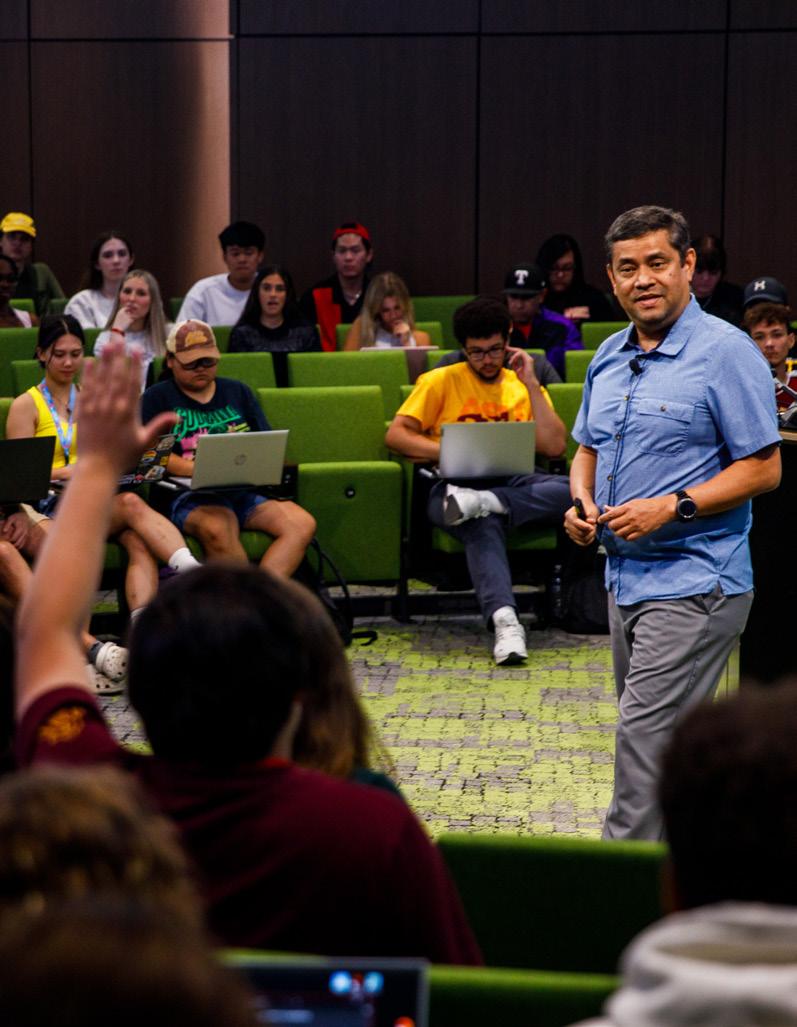
Photo by Andy DeLisle/Knowledge Enterprise
“Most universities have mathematics, social science or natural science requirements but not sustainability thinking,” Lobo said.
“I would argue this is where the general studies requirement most reflects the vision that’s governing ASU as a university.”
Sustainability, had a front row seat for the development and deployment of General Studies Gold. More specifically, Lobo was involved in crafting one of the new knowledge areas — Quantitative Reasoning.
The new categories provide a breadth of knowledge that is aimed to help students be better citizens and thinkers, according to Lobo.
Perhaps the most distinctive feature of the new general studies requirements is the addition of “Sustainability Thinking.”
“Most universities have mathematics, social science or natural science requirements but not sustainability thinking,” Lobo said. “I would argue this is where the general studies requirement most reflects the vision that’s governing ASU as a university.”
The changes to the required topic areas are meant to expose future ASU undergraduate students to a systems thinking approach. They will have the opportunity to envision the future version of the planet and how they may contribute to a prosperous life for all.
“This is ASU’s statement to the world, to students, to the parents of students, that we believe that an undergraduate education needs to equip and teach students what are the challenges and opportunities of sustainable development,” Lobo said.
Beyond the new categories, Lobo says that the changes to what is required for a course to be listed within a category is key. These changes are more than simply checking a box to fit within the category, but will transform the way courses are taught at a holistic level.
It starts with the learning outcomes of a course.
“The emphasis here is transparency to the students,” Lobo said. “What should I expect this course to teach me? What are the learning outcomes?”
Editor’s note: Read the full story by Matt Oxford, published April 18, 2024, on ASU News.
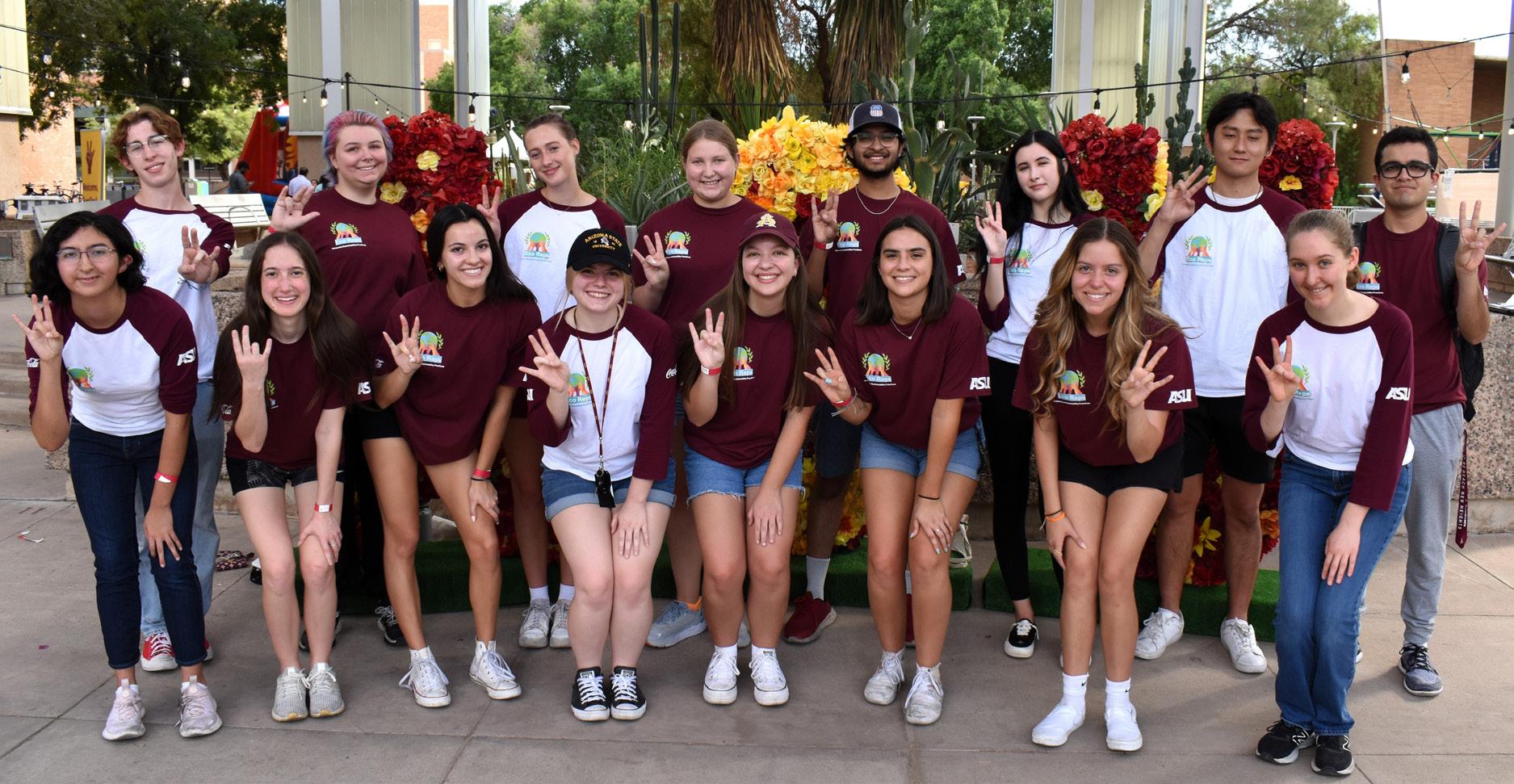
When Selena Morse began scuba diving at age 10, the beauty of marine life wasn’t the only thing she encountered – the amount of human-produced waste floating around among schools of brilliant blue damselfish and bits of plastic being nibbled by unassuming puffer fish was more than a little disheartening.
The experience sparked Morse’s interest in sustainability, which she brought to Arizona State University as a double major in supply chain management and sustainability leadership.
“One of the reasons I decided to come to ASU was because of the sustainability practices already in place on campus and all the research being done on it here,” Morse said.
Like many students, Morse sought opportunities to engage with like-minded individuals when she arrived on campus and discovered the Eco Reps program. The program began in the fall of 2022 and is funded by ASU’s strategic partner, Coca-Cola, to train students to serve as stewards of sustainability for their residential communities. Twenty students across ASU Tempe campus residential communities are selected each semester as paid Eco Reps.
Paige Strickland, program manager, ASU University Sustainability Practices, oversees the program. Strickland wrote the training materials, which include a digital guidebook with contributions from university partners.
“Since students from all academic backgrounds are encouraged to apply, we set a basis of sustainability understanding by teaching students the basics of essential topics including waste minimization, food waste, energy, water, global sustainability, transportation and more,” Strickland said.
Students also learn about best practices for engaging with peers through community-based social marketing and completing USP’s Seeds of Sustainability training.
The students then share their learning with their peers through weekly interactive activities and events. Eco Reps receive a kit of sustainable materials for use throughout the semester as incentives and giveaways.
One of Morse’s favorite activities was a sustainability scavenger hunt, where she and other Eco Reps, like architecture major Hope Schmitt, guided students to discover various sustainable points of interest on campus, such as water refill stations and bike racks, to encourage them to cut back on car transport.
“Given my major, I really want to be involved in sustainability for the sake of the future of the planet,” Schmitt said. “We need to make sure we’re building sustainable practices into the function of buildings, from plumbing to waste management.”
She had the chance to learn more about that during a group Eco Reps activity touring some of ASU’s many LEED-certified buildings.
“The Eco Reps program gives me the ability to put that knowledge into practice and learn more about it so that I can incorporate it in my personal life and future career,” Schmitt said.
Strickland is encouraged by the program’s success and hopes to see its reach grow across the university.
“I want the Eco Reps program to be known as a strong community, where students from every background can come together behind the mission of galvanizing campus sustainability and educating their peers on issues that will affect them the most in the future,” she said. “I also want to collaborate with other campus departments and student groups to make the program as intersectional as possible.”
Editor’s note: This story provides updates to an ASU News article originally written by Emma Greguska and Lillie Boudreaux.
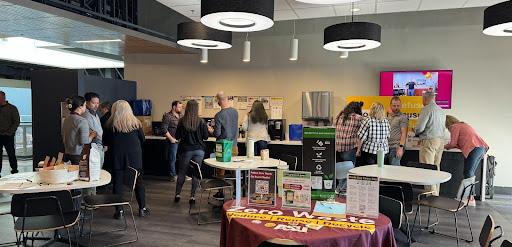
ASU Supply Chain Management led a sustainable alternative for single-use plastic K-Cups® to reduce operating expenses and waste sent to ASU’s landfill. The SCM team believed offering reusable K-Cups and disposing of used grounds in a nearby compost bin using the Office Compost Program would save money and reduce waste.
From July through December 2023, University Services Building employees used 4,660 K-Cups. ASU Zero Waste subsequently spent $1,289 to recycle the K-Cups via the Blue Bag Program
After receiving Sustainability Initiatives Revolving Fund grant funding, SCM staff distributed a survey to gauge the interest in reusable K-Cups and fresh-ground coffee. The SCM staff subsequently held two events in April 2024 to distribute approximately 250 reusable K-Cups and provide locally sourced and Fair Trade coffee.
The reusable K-Cup initiative is part of a larger effort by ASU Facilities Development and Management, Supply Chain Management, University Sustainability Practices and Zero Waste to reduce waste recycling costs and increase sustainability efforts in ASU office spaces. Reducing single-waste plastic and food waste will help ASU create a circular resource system and reach its 30% aversion and 90% diversion goals by 2025.
Editor’s note: This story is featured in the spring 2024 University Sustainability Practices newsletter.
Empowering future leaders
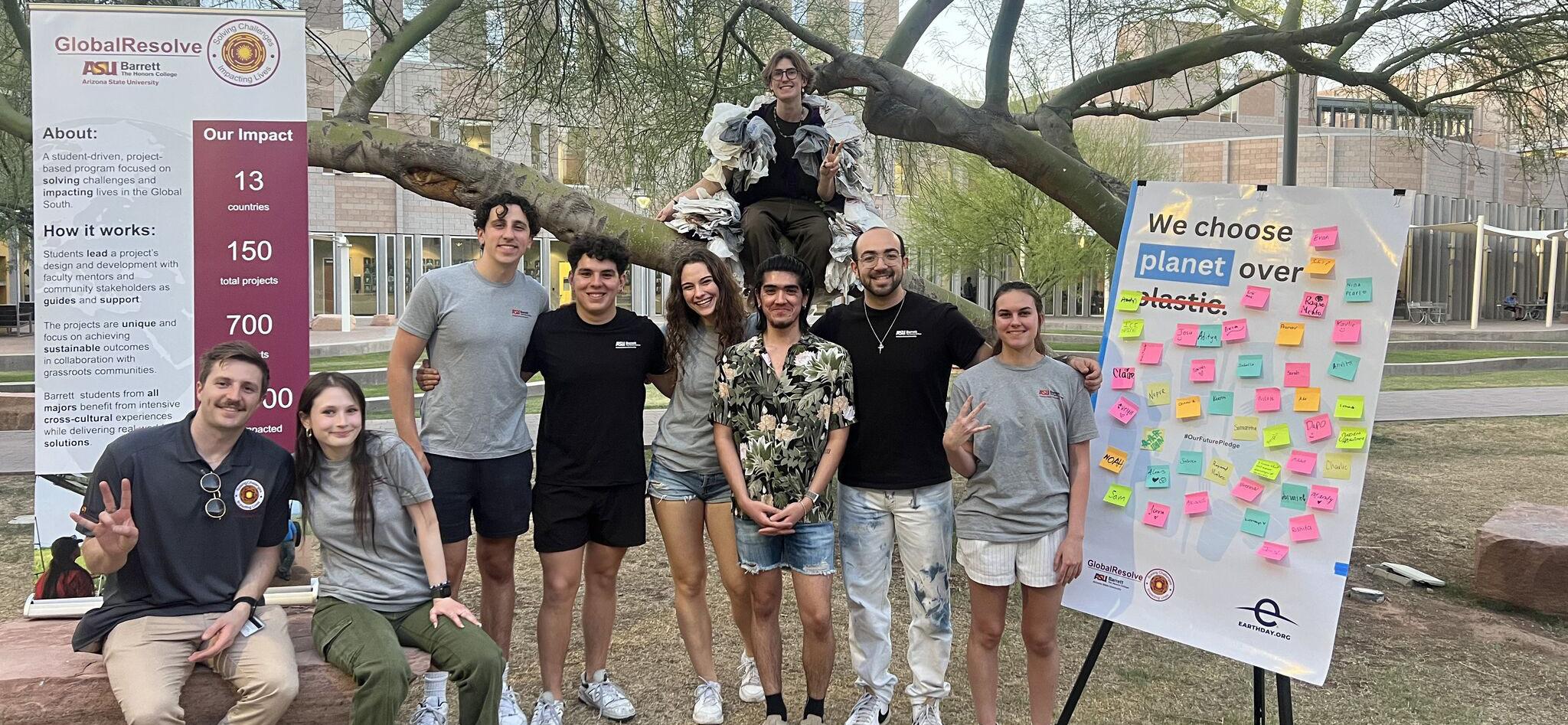
Arizona State University has ambitiously committed to drastically reducing its single-use plastics on campus, and Barrett, The Honors College, is playing a pivotal role in this initiative through the GlobalResolve program. GlobalResolve is a service-learning initiative at Barrett, that enriches students’ education by involving them in hands-on projects aimed at making a positive impact on global communities. In collaboration with ASU’s Julie Ann Wrigly Global Futures Laboratory and ASU Zero Waste, GlobalResolve students are spearheading a pilot project aimed at changing behaviors of purchasers as an essential stepping stone towards the culture change needed to achieve a single-use plastics reduction of 90% in Barrett. This effort is part of ASU’s broader goal to establish a circular resource system and to lessen the environmental impact of plastic waste on its campus and the communities it serves.
Under the guidance of project mentor Kendon Jung, manager, ASU Zero Waste, Barrett students have employed a multifaceted approach to tackle the
plastic waste problem. They’ve integrated six different resources such as the Plastic Free Campus initiative, the National Wildlife Federation’s Plastic Reduction Partnership, ASU’s SUP Reduction Roadmap and UNICEF’s Our Futures program into their project. Their process involved systematically interviewing staff to identify sources of waste, conducting a detailed waste audit to discern trends in material streams, and utilizing a human-centered design approach to instigate cultural change within the community.
The students’ efforts culminated in an immersive event held on April 21, 2024, where they showcased the challenges, opportunities and actionable steps ASU students can take to contribute to the solution. The initial phase of the project generated 72 actionable opportunities, which the Barrett administration will be using to implement in the fall 2024 semester.
This pilot project is designed to do more than just reduce plastic waste; it also aims to leverage student leadership as a transformative force, engage academic units in a vertically integrated manner, and create a replicable model that can be adopted by universities worldwide. The GlobalResolve initiative aligns with ASU’s commitment to sustainability, serving as a living laboratory where students can engage in meaningful projects that have a lasting impact on the university and beyond.
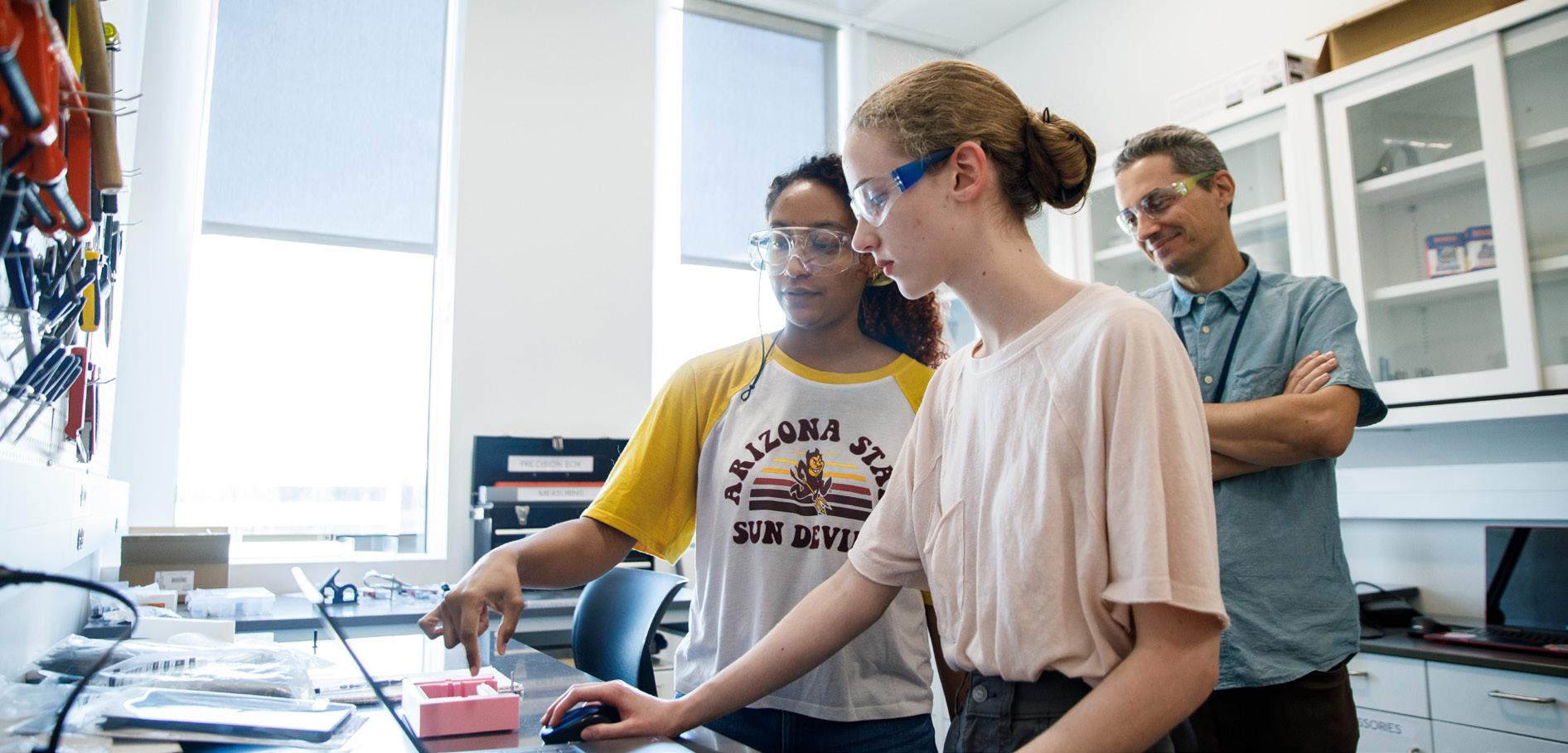
The U.S. Department of Energy-led Clean Energy Education and Empowerment Initiative has announced that Arizona State University now joins the initiative as a partnering university.
The Julie Ann Wrigley Global Futures Laboratory at ASU joins the Massachusetts Institute of Technology Energy Initiative and the Stanford Precourt Institute for Energy as the third university to work with DOE to increase the participation, leadership and success of women in clean energy.
A DOE-led initiative since 2011, Clean Energy Education and Empowerment, or C3E, works to highlight, recognize and empower women in clean energy. More than 100 mid-career professionals have been recognized by C3E for their outstanding leadership and achievements across eight categories: business, education, entrepreneurship and commercialization, finance and investment, fundamental and applied research, government, international, and policy and advocacy.
The C3E community connects those working in clean energy with an opportunity to engage with peers and mentors via social media platforms, webinars and other events.
“DOE is excited to bring ASU on board as we continue our commitment to enrich the talent pool and help shape a robust and sustainable clean energy future,” said Maria T. Vargas, lead C3E ambassador and senior program advisor. “Our collaboration with ASU will further broaden the reach and representation of the C3E initiative and help further promote women’s leadership in the energy sector.”
Kelly Barr, associate vice president and chief alliance officer at the Global Futures Laboratory, also serves as a C3E ambassador. This role is given to distinguished senior executives, academics, government officials and thought leaders who serve as role models and advocates for women in clean energy.
“Women are underrepresented in the clean energy sector, especially in leadership positions,” Barr said. “A future built on clean energy has the potential to reach everyone — it only makes sense that the leaders in clean energy would reflect the communities they serve. This partnership with the DOE is an important step in the right direction.”
As a partnering university, ASU will work with DOE to manage the C3E Initiative, including holding annual meetings and opportunities to promote women’s leadership. The Global Futures Laboratory at ASU provides key engagement spaces for scientists, scholars, innovators and leaders to address pressing societal challenges and will bring this to C3E.
“We are thrilled that the Global Futures Laboratory at ASU is partnering with the Department of Energy’s C3E Initiative,” said Sally C. Morton , executive vice president at ASU’s Knowledge Enterprise.
“Recognizing the outstanding leadership of women in the clean energy sector is vital for fostering innovation and advancing the industry.”
ASU will collaborate with the Massachusetts Institute of Technology Energy Initiative, Stanford and the DOE on the planning and implementation of C3E’s annual awards and symposium. The 13th annual symposium will be held at Stanford University in November, and the 14th symposium will be held at ASU in 2025.
“We are honored to join the prestigious C3E initiative,” said Ellen B. Stechel , co-director of LightWorks at the Global Futures Laboratory and executive director for the Center for an Arizona Carbon-Neutral Economy.
“At ASU, fostering inclusion is not only an essential mandate of our charter but also a strategic necessity.”
Stechel, who is also a senior global futures scientist with the Global Futures Laboratory and a professor of practice in the School of Molecular Sciences, serves as the ASU lead in this partnership. By promoting women in the energy sector, Stechel said, our society can harness a wider range of perspectives and talents, driving innovation and impactful change.
“This partnership reflects our commitment to creating equitable opportunities and advancing clean energy solutions,” Stechel said. “Together, we can accelerate the transition to a sustainable future while ensuring that the energy sector is inclusive and representative of all voices.”
Editor’s note: Read the original story by Katelyn Reinhart, published June 24, 2024, on ASU News
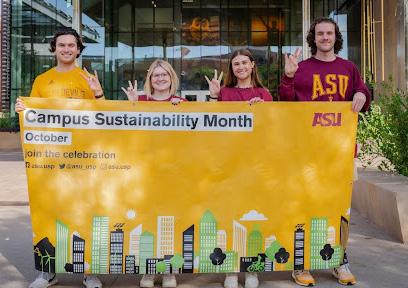
The Sustainability Initiatives Revolving Fund provides financial support for sustainability projects that foster campus engagement and promote sustainable practices. Mini and Tier One grants are available to the ASU community.
Mini grants are designed for peer-to-peer initiatives and events during heightened sustainability awareness months like Campus Sustainability Month, Earth Day Every Day and Sun Devil Athletics’ Green Games. The mini grants support projects that advance sustainability education and encourage positive behavior change, focusing on reducing waste, conserving resources and promoting equitable practices. Project examples include waste-reduction campaign signage, supporting sustainable aspects of events and small-scale initiatives like reusable K-Cups® in university offices.
SIRF Tier One grants support more significant projects highlighting ASU’s sustainability culture and engaging students and employees in sustainability practices. Project examples include installing water refill stations and organizing large-scale, sustainable practices events, like the 2023 multi-day Carbon Summit.
Visit the SIRF webpage for details on former grant recipients and grant guidelines. Empowering future leaders
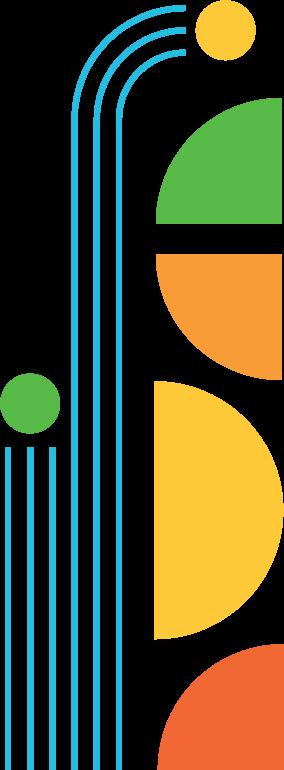
In this section:

Arizona State University is setting the standard for innovation, sustainability and community engagement. Through its pioneering initiatives, ASU demonstrates how institutions can drive positive change, whether by advancing research that addresses global challenges, fostering inclusivity, or promoting sustainability across its campuses. By embodying the values of collaboration and impact, ASU not only inspires its students and faculty but also serves as a model for other universities and organizations worldwide, showing that bold leadership and a commitment to excellence can create a better future for all.
“Universities are uniquely positioned to generate innovative ideas, advance new technologies and cultivate economic development. As one of the nation’s leading research institutions, it is ASU’s responsibility to advance real-world solutions that benefit society to change the way the world solves problems.”
Sally C. Morton, ExecutiveVice President, ASU Knowledge Enterprise
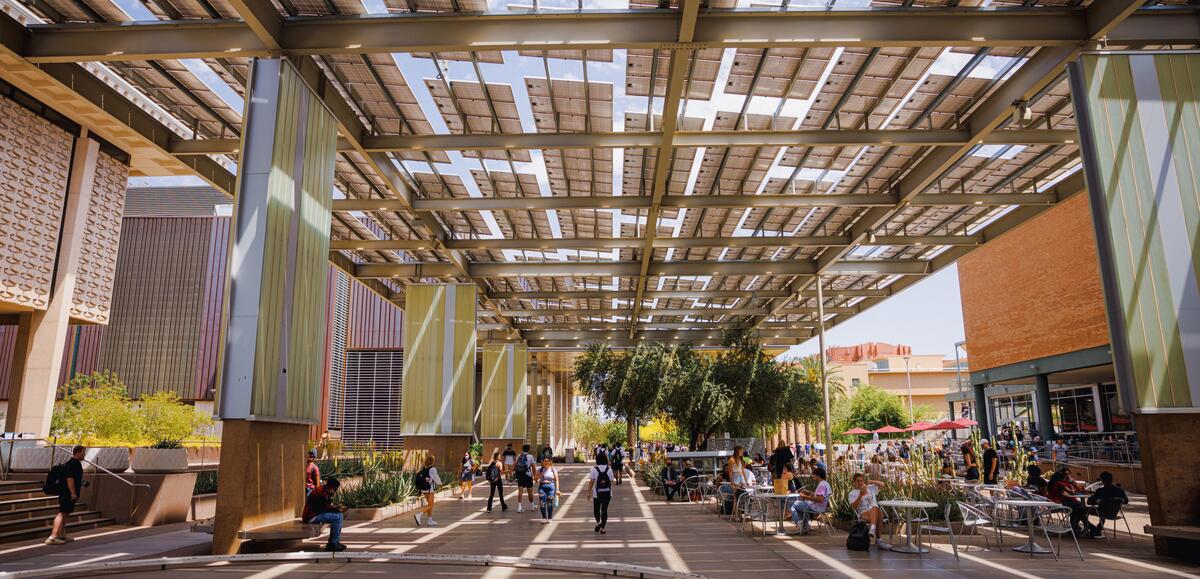
Sustainability at Arizona State University takes many forms. Solar panels soak in rays of sun to power operations; buildings are crafted with builtin strategies to decrease carbon emissions; and university groups harvest campus-grown produce.
Because of its longstanding commitment to ensuring a thriving future for all, ASU earned a rating of No. 1 in the United States and No. 2 in the world for its sustainability practices by the Sustainability Tracking, Assessment & Rating System, or STARS, a program from the Association for the Advancement of Sustainability in Higher Education. ASU not only scored above other highly esteemed institutions, but also beat its previous score — increasing from 2020 by four points, totaling 91.10 points out of 100.
STARS measures scores from higher-education institutions in categories including academics, engagement, operations, planning and administration,
and innovation and leadership. This ranking marks the second consecutive platinum ranking for ASU, making it one of only 12 worldwide institutions to maintain a platinum label in 2023. ASU will hold its position until 2026, at which point scores are reassessed.
According to the report, ASU achieved a perfect score in its research rating and a near-perfect score for curriculum. Academics and engagement were among ASU’s strongest categories in the ranking. University officials have increased sustainability efforts through both educational efforts and continued action efforts.
“The growth of sustainability at ASU in the past two decades, as both a discipline and a practice, is striking and now decorated with two firsts: founding the School of Sustainability in 2006 and being recognized as the top institution in the U.S. for sustainability performance,” said Marc Campbell, executive director of sustainability at ASU. “The university has continually set a high leadership standard that we’re seeing inspire other institutions.”
STARS was not the only major ranking ASU achieved in the last year: It also retained its No. 1 spot in the U.S. for the United Nations Sustainable Development Goals rankings.
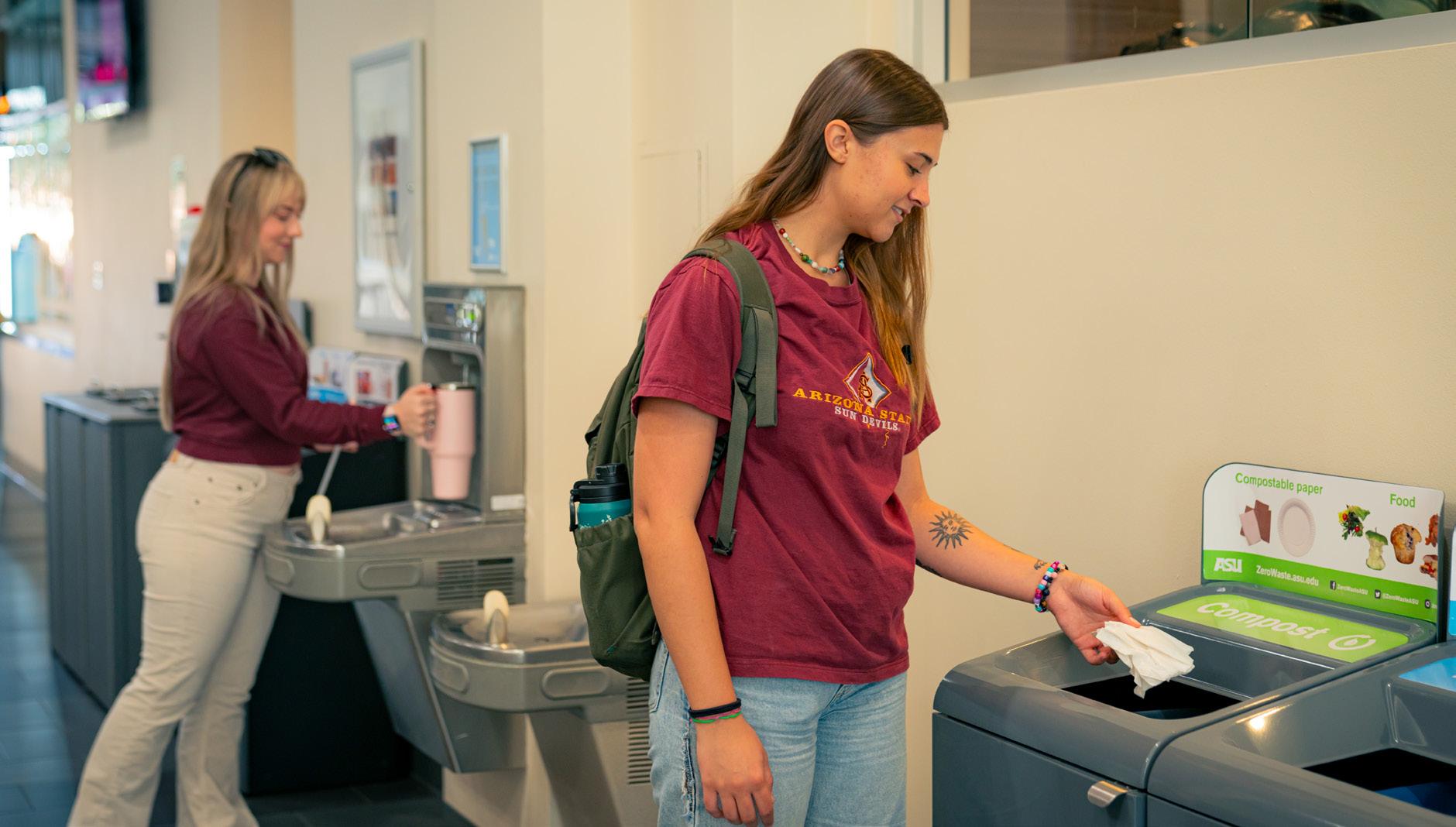
The Times Higher Education Impact Rankings measure the effects made by universities across the globe as they address the SDGs, a set of 17 specific targets agreed upon by all U.N. member states in 2015 to achieve a more sustainable future by 2030. Through its Impact Rankings, Times Higher Education once again has recognized ASU for its commitment to assuming fundamental responsibility for the communities it serves.
For the fifth consecutive year, ASU retained its No. 1 spot in the United States and top-10 ranking globally for its work through education, research and practice in alignment with the SDGs. ASU also ranks No. 1 in the U.S. for 11 out of the 17 SDGs.
“ASU’s repeated top ranking is more than a point of pride, it is proof of our unwavering commitment to creating the change we want to see in the world,” said ASU President Michael M. Crow. “As a 21st-century university dedicated to finding solutions to the world’s most pressing problems, our ranking reflects our priorities and progress in areas that demand urgent attention.”
ASU has maintained its No. 1 spot in the U.S. and its place in the top 10 globally since 2020. ASU’s ranking was awarded in recognition of its leadership in these top three areas:
No. 1 in the world for SDG 14, which addresses life below water; ahead of North Carolina State University, Penn State University and the University of Georgia.
No. 2 in the world for SDG 11, focused on sustainable cities; ahead of Michigan State University, Penn State University and the Massachusetts Institute of Technology..
No. 3 in the world for SDG 15, which explores life on land; ahead of Penn State University, Michigan State University and the University of Maryland.
The other SDGs in which ASU ranked No. 1 in the U.S. are SDG 1 (no poverty), SDG 4 (quality education), SDG 6 (clean water and sanitation), SDG 7 (clean energy), SDG 10 (reduced inequalities), SDG 12 (responsible consumption and production), SDG 13 (climate action) and SDG 16 (peace, justice and strong institutions).
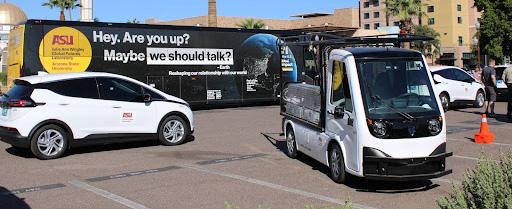
Arizona State University continues to advance its commitment to sustainability through a series of strategic initiatives to promote electric transportation across its campuses and enhance its electric vehicle infrastructure. These efforts support ASU’s sustainability goals and help reduce the university’s carbon footprint while improving accessibility and convenience for the Sun Devil community.
The latest measures include vital developments in electric vehicle deployment, campus transportation and partnerships that further position ASU as a leader in sustainable innovation.
Fiscal Year 2024 achievements:
▪ Infrastructure: ASU expanded its electric vehicle infrastructure by installing 20 new charging ports at the University Services Building on the ASU Tempe campus, facilitating the transition of fleet vehicles to electric power.
▪ APS partnership: In collaboration with APS’s Take Charge program , ASU installed four networked charging stations, enhancing the accessibility and convenience of charging electric vehicles across campus.
▪ New vehicle deployment: ASU Facilities Development and Management received seven Ford F-150 Lightning electric trucks, which have been strategically allocated to the ASU Downtown Phoenix, Polytechnic, Tempe and West Valley campuses to support operations.
▪ Electric intercampus shuttle: ASU Parking and Transportation Services introduced a fully electric coach as part of the intercampus shuttles , offering a sustainable transportation option for students and employees traveling between campuses.
▪ Shared fleet pilot: ASU launched a shared fleet pilot program at the University Services Building , providing ASU employees access to several electric passenger vehicles for intercampus travel. This initiative promotes the use and accessibility of electric vehicles within the university community.
Read about how ASU is increasing sustainable transit options.
Leading by example
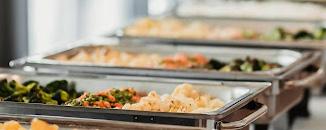
ASU Zero Waste, Sun Devil Hospitality and the Memorial Union transitioned campus catering to a “zero waste by default” model over the 2023–24 academic year. This collaborative effort introduced a new approach based on service design principles. Sun Devil Hospitality and Student Unions and Centers — 13 in total — were interviewed to create a catering service blueprint. The team identified 27 process opportunities and 61 products — or 43% of the disposable product profile to adjust. These opportunities included updating processes, swapping one product for another, placing Zero Waste messaging in appropriate locations and developing guidelines and training materials.
The project was soft-launched in December 2023 at the Holiday Coffee event, with a Tempe campus rollout in February 2024. The project is estimated to have eliminated 126,429 single-use plastics from the Tempe locations, and a full projected impact of 379,287 units will be averted by February 2025.
As the teams continue to monitor and control for quality assurance, the Downtown Phoenix, Polytechnic and West Valley campus teams are prepared to activate the service blueprint method to roll out the “zero waste by default” toolkit across all campus locations in the near future.
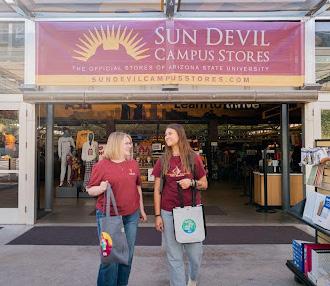
Sun Devil Campus Stores are on track to avoid 140,000 pounds of greenhouse gas emissions by eliminating single-use plastic bags. The stores have avoided using over 40,000 plastic bags since the initiative began in 2024. The reduction will save 200,000 driving miles of emissions — enough to circle Earth eight times.
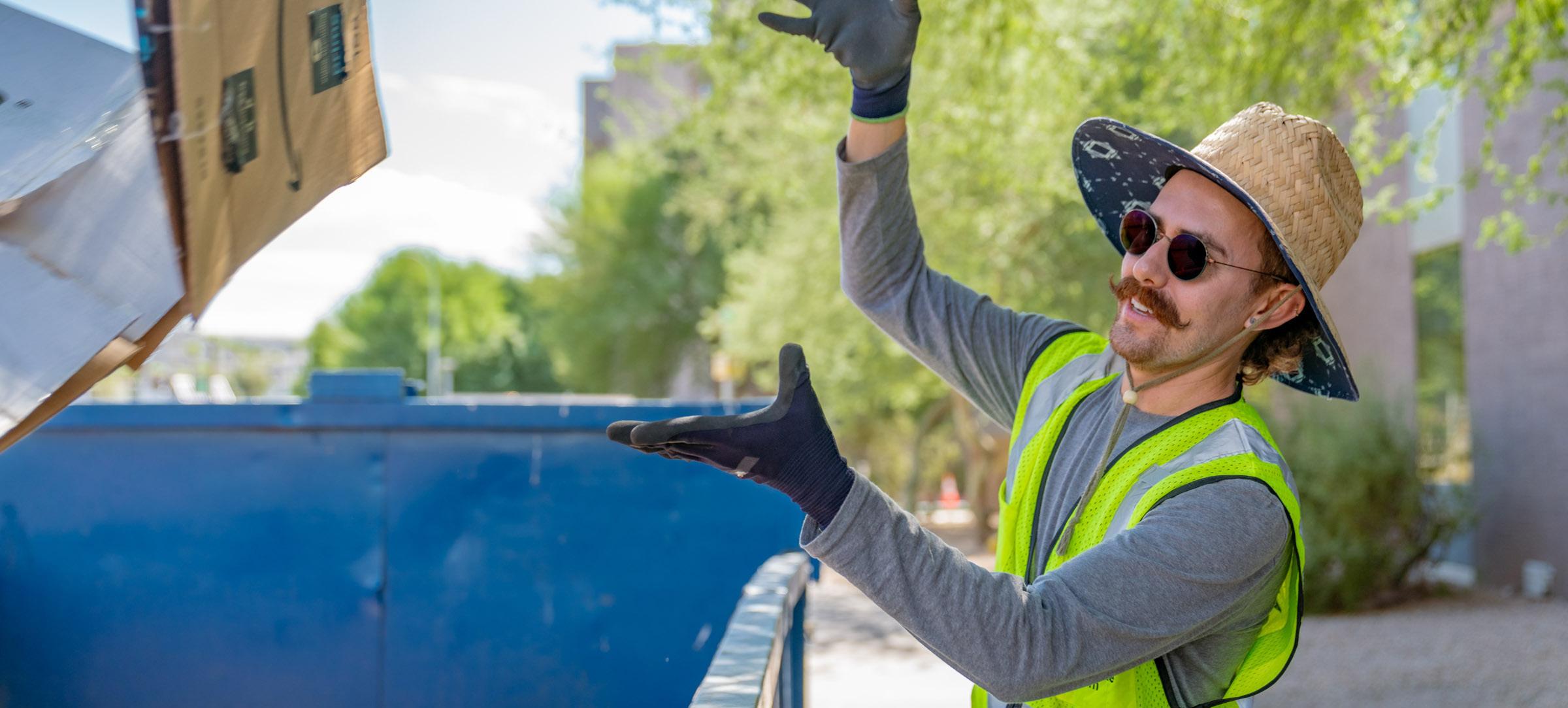
Ditch the Dumpster, a sustainability initiative at Arizona State University designed to reduce waste collected during move-in and move-out periods, supports local nonprofits and educates campus residents about proper recycling and reuse practices. ASU Zero Waste leads Ditch the Dumpster efforts to collect and donate usable items that would end up in landfills. ASU Zero Waste encourages incoming students only to bring essential items to campus and purchase secondhand when possible. Social media campaigns and the collection of cardboard boxes by the Zero Waste team on-site support efforts to promote proper recycling during move-in and move-out.
At the end of the academic year, donation bins are strategically placed across all ASU residential communities, permitting students to donate food, hygiene products and miscellaneous items to local charities and preventing unnecessary waste. In the Fiscal Year 2024, the DitchThe Dumpster program experienced significant success, donating over 50,000 pounds of usable items to Goodwill, 3,400 pounds of food and 800 pounds of hygienic products.
As we look to the future, Arizona State University remains steadfast in its pursuit of driving progress in sustainability innovation, community empowerment and operational excellence.
Our journey is ongoing, and we recognize that continuous collaboration, research and education are key to achieving lasting impact. Rooted in our charter, we are building a future where sustainability and inclusivity shape a thriving world for generations to come.
ASU is a comprehensive public research university , measured not by whom it excludes , but by whom it includes and how they succeed ; advancing research and discovery of public value; and assuming fundamental responsibility for the economic, social, cultural, and overall health of the communities it serves .